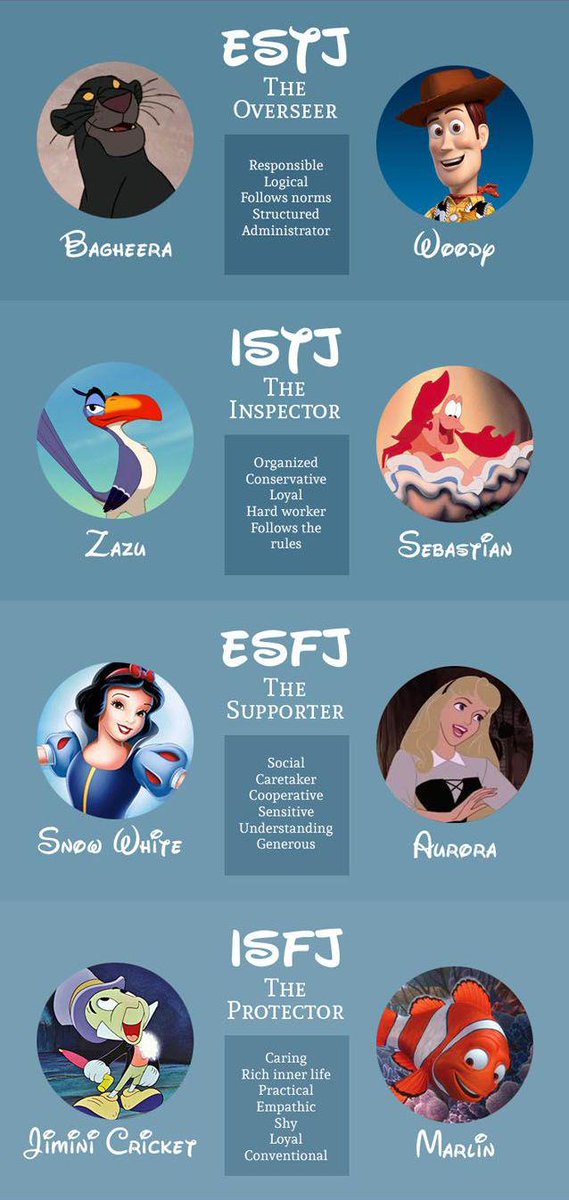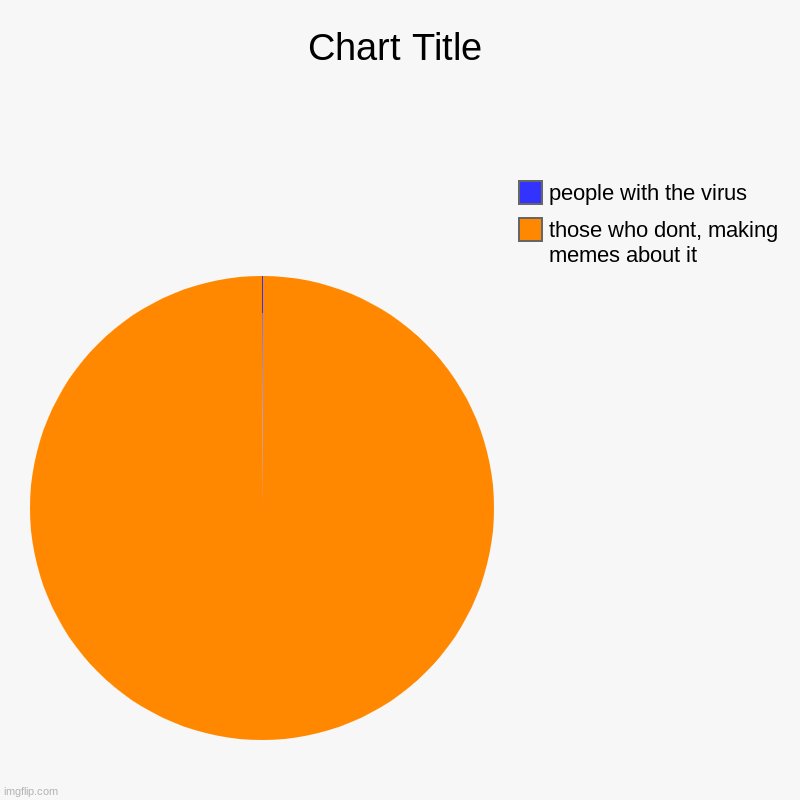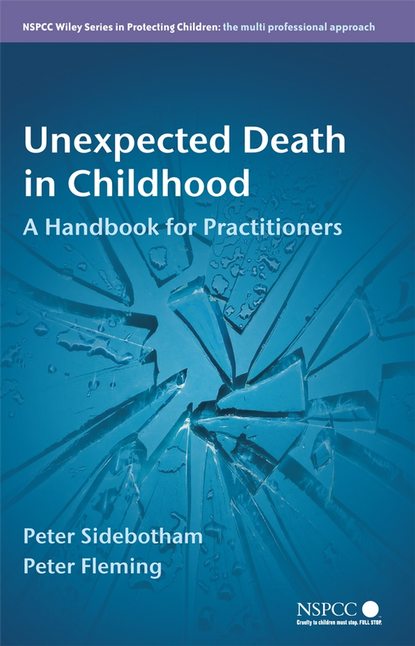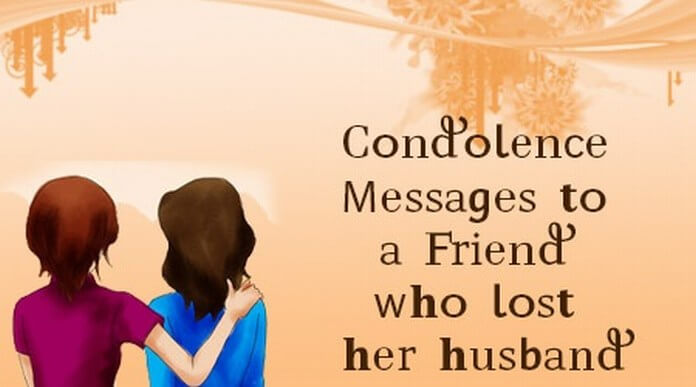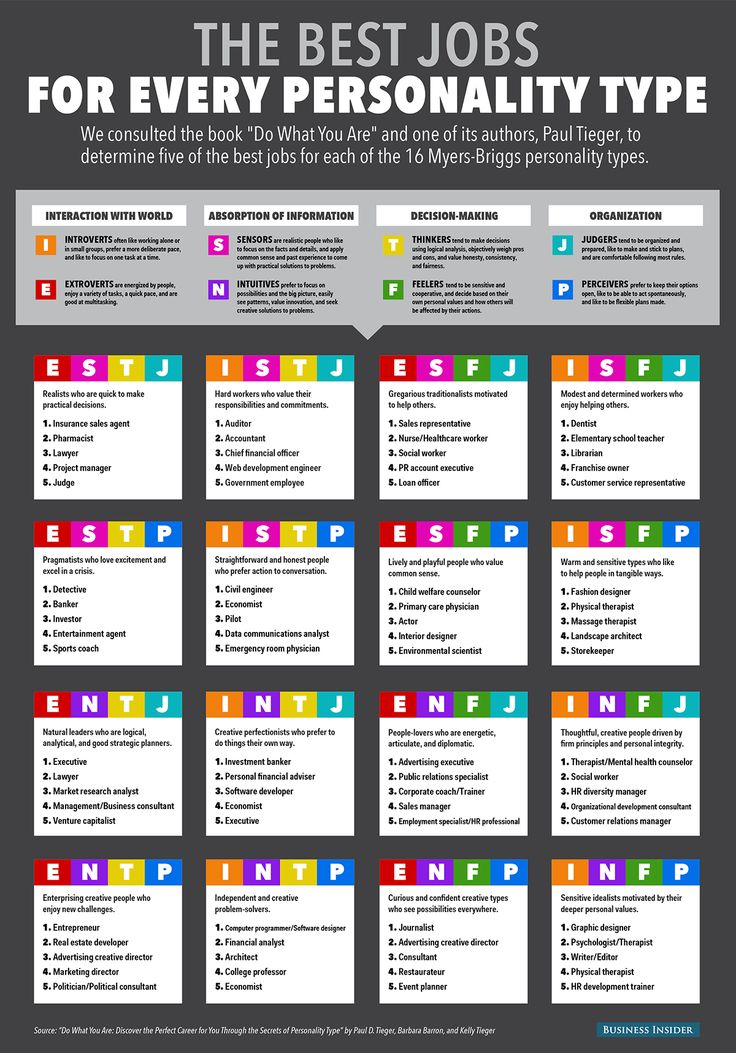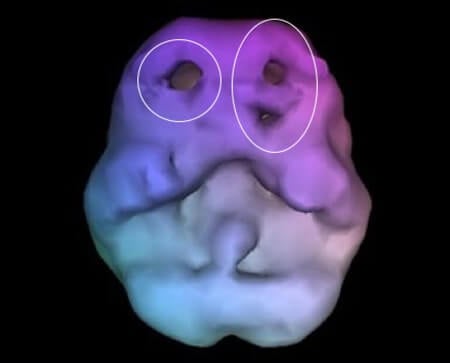Personality types fictional characters
The Myers-Briggs® Personality Types of 325 Fictional Characters
Have you ever wondered which fictional characters have your Myers-Briggs® personality type? Today we’re going to explore the types of over three hundred fictional characters! This can give you an idea of how your personality type might show up in different situations or at different levels of maturity. Let’s get started!
Not sure what your personality type is? Take our new personality questionnaire here. Or you can take the official MBTI® here.
The Personality Types of 325 Fictional CharactersThe ENFP “Visionary” – Imaginative/Inspiring/InnovativeFrom left to right: Ariel (The Little Mermaid), Barley Lightfoot (Onward), Anne Shirley (Anne of Green Gables), Wizard Howl (Howl’s Moving Castle), Josephine “Jo” March (Little Women), John Keating (Dead Poets Society)
Imaginative, energetic, and friendly, ENFPs are often the most endearing of fictional characters. These types see life as full of possibilities and adventures that they can’t wait to explore. They make connections between events and data very quickly, seeing random links where others do not. Their focus on the big picture can make them forward-thinking and creative, but it can also mean they trip up over details in the real world. Spontaneous and flexible, ENFPs prefer being innovative rather than relying on a pre-ordained plan. Freedom is crucial to these types, and they will fight being tied down by anyone. When it comes to decisions, they rely on their individual values to guide them.
Bob Cratchit (A Christmas Carol), Anne Shirley (Anne of Green Gables), The Mad Hatter (Alice’s Adventures in Wonderland), Grandpa Joe (Charlie and the Chocolate Factory), Josephine “Jo” March (Little Women), Peter Pan, Pippi Longstocking, Wizard Howl (Howl’s Moving Castle), Ellie (Up), Clementine Kruczynski (Eternal Sunshine of the Spotless Mind), John Keating (Dead Poets Society), Barley Lightfoot (Onward), Patrick (The Perks of Being a Wallflower), Renly Baratheon (Game of Thrones), Ariel (The Little Mermaid), Elizabeth Bennett (Pride and Prejudice, the book, not the movie), Percival Blakeney (The Scarlet Pimpernel).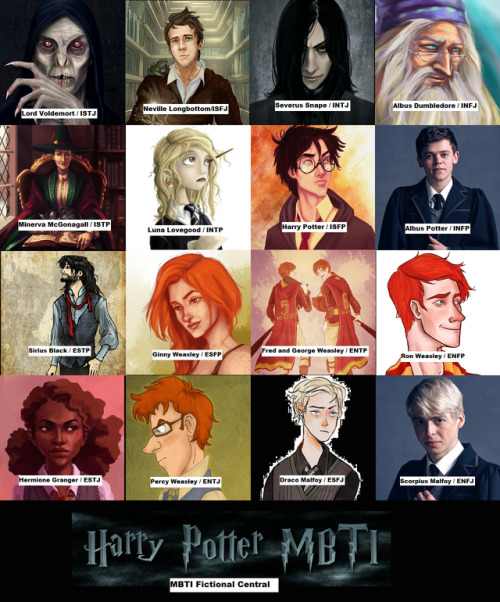
From left to right: Tony Stark “Iron Man,” Willy Wonka (Charlie and the Chocolate Factory), The Tenth Doctor (Doctor Who), Captain Jack Sparrow (Pirates of the Caribbean), Fleabag (Fleabag), Augustus Waters (The Fault in Our Stars).
Mentally quick and often ingenious, the ENTP lives to dismantle tradition and explore new ways of seeing things. These types are rebellious but curious, open to many ideas, but anxious to find the truth. They enjoy solving challenging problems, analyzing a situation strategically, and developing novel solutions. Bored by routine, they will rarely do anything by the book. They tend to chase one interest after another, finding energy in a never-ending flow of ideas and alternatives.
Fictional ENTPs:Tony Stark (Iron Man), Helena (A Midsummer Night’s Dream), Augustus Waters (The Fault in Our Stars), Fred and George Weasley (Harry Potter), Henry Tinley (Northanger Abbey), The Cheshire Cat (Alice’s Adventures in Wonderland), Willy Wonka (Charlie and the Chocolate Factory), Lord Henry “Harry” Wotton (The Picture of Dorian Grey), Mei Hatsume (My Hero Academia), Dustin Henderson (Stranger Things), Murray Bauman (Stranger Things), Klaus Hargreeves (The Umbrella Academy), The Tenth Doctor (Doctor Who), Jeff Winger (Community), Fleabag (Fleabag), Leo Valdez (Percy Jackson and the Olympians), Mercutio (Romeo and Juliet), Will Herondale (The Infernal Devices), Captain Jack Sparrow (Pirates of the Caribbean), Jack Skellington (The Nightmare Before Christmas), Ryuk (Death Note).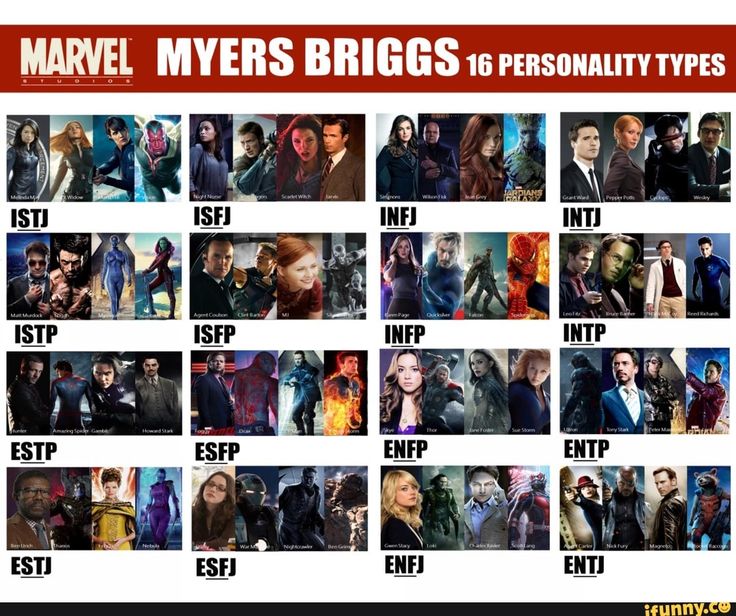
From left to right: Frodo Baggins (Lord of the Rings), Newt Scamander (Fantastic Beasts and Where to Find Them), The Little Prince, Jacob Portman (Miss Peregrine’s Home for Peculiar Children), Lucy Pevensie (The Chronicles of Narnia), Fern (Charlotte’s Web)
Creative and contemplative, INFPs look for meaning over material success. These types are driven by their imagination and their hope for a better, kinder world. More than anything, INFPs are loyal to their personal values. They gain their perspective of right and wrong from an independent standpoint, rather than looking to society’s rules and agendas. Naturally curious, they are adept at thinking outside-the-box and seeing many perspectives. Their lifestyle is flexible, adaptable, and tolerant unless a value is threatened.
Fictional INFPs:Belle (Beauty and the Beast), Newt Scamander (Fantastic Beasts and Where to Find Them), Scout Finch (To Kill a Mockingbird), Louis de Pointe du Lac (Interview with the Vampire), Nico de Angelo (Percy Jackson and the Olympians), The Little Prince (The Little Prince), Quasimodo (The Hunchback of Notre D’ame), Mike Ross (Suits), Frodo Baggins (Lord of the Rings), Faramir (The Lord of the Rings), Romeo Montague (Romeo and Juliet), Coraline Jones (Coraline), Lucy Pevensie (The Chronicles of Narnia), Fern (Charlotte’s Web), Jacob Portman (Miss Peregrine’s Home for Peculiar Children), Marius Pontmercy (Les Miserables), Marianne Dashwood (Sense and Sensibility), Lady Dedlock (Bleak House), Tamaki Amajiki (My Hero Academia), Eric Alphonse (FullMetal Alchemist: Brotherhood), Nagato (Naruto), Joyce Byers (Stranger Things), Will Byers (Stranger Things), Vanya Hargreeves (The Umbrella Academy), Hester Prynne (The Scarlet Letter).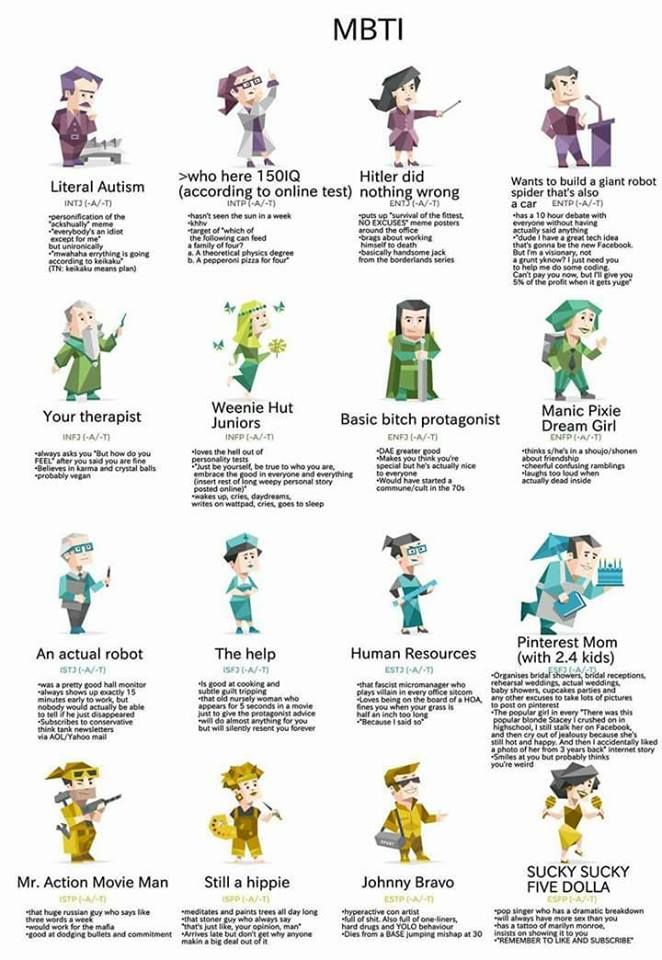
Read This Next: 24 Signs That You’re an INFP, the “Dreamer” Personality Type
The INTP “Prodigy” – Curious, Creative, AnalyticalFrom left to right: Alice (Alice’s Adventures in Wonderland), Victor Frankenstein, L Lawliet (Death Note), Hiccup (How to Train Your Dragon), Nick Carraway (The Great Gatsby), Arthur Weasley (Harry Potter).
The INTP prodigy is driven to understand the logical components behind everything around them. They question and scrutinize ideas and systems, trying to decipher the underlying framework at play. More interested in ideas than social rules, they can seem tactless even if they do care what people think of them. INTPs enjoy exploring ideas and tend to have an open, curious outlook on life. They are eager for anything that will stretch the bounds of their mind and make them question and refine their thinking.
Fictional INTPs:Margaret “Meg” Murry (A Wrinkle in Time), Arthur Weasley (Harry Potter), Smaug (The Hobbit), Pierre Bezukhov (War and Peace), Nick Carraway (The Great Gatsby), Alice (Alice’s Adventures in Wonderland), Hiccup (How to Train Your Dragon), Matilda (Matilda), Tsuyu Asui “Froppy” (My Hero Academia), Scott Clarke (Stranger Things), L Lawliet (Death Note), Bruce Banner “Hulk”, Neo (The Matrix), Elliot Alderson (Mr.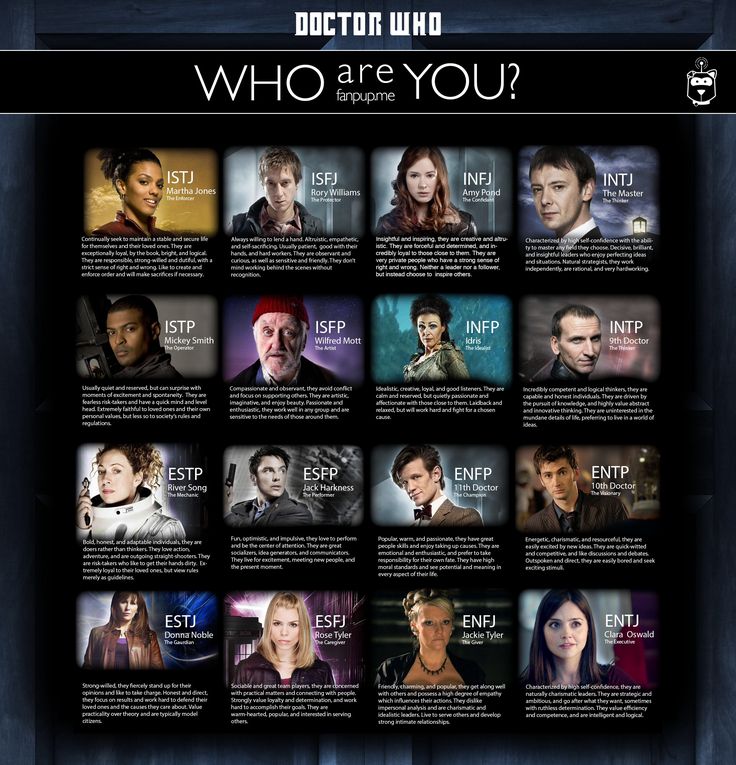 Robot), Ranpo Edogawa (Bungou Stray Dogs), Winston Smith (1984), Victor Frankenstein, Ariadne (Inception), Betee Latier (The Hunger Games).
Robot), Ranpo Edogawa (Bungou Stray Dogs), Winston Smith (1984), Victor Frankenstein, Ariadne (Inception), Betee Latier (The Hunger Games).
From left to right: Morpheus (The Matrix), Donna Paulsen (Suits), Anna Karenina, Queenie Goldstein (Fantastic Beasts and Where to Find Them), Professor Charles Xavier “Professor X” (X-Men), Margaery Tyrell (Game of Thrones)
Harmony-focused and insightful, ENFJs are driven to unite people towards a cause. They seem to have an innate sense of other people’s potential, and they enjoy inspiring people to grow. These types are more interested in what’s going on behind the scenes than what’s apparent on the surface, and because of this, they can often sense underlying motivations and needs. They have a gift for taking care of people’s emotional needs and counseling during tough situations.
Fictional ENFJs:Margaery Tyrell (Game of Thrones), High Sparrow (Game of Thrones), Donna Paulsen (Suits), Luke Castellan (Percy Jackson and the Olympians), Anna Karenina, Phoebe Caulfield (The Catcher in the Rye), Mufasa (The Lion King), Morpheus (The Matrix), Diana Prince “Wonder Woman (Wonder Woman), Queenie Goldstein (Fantastic Beasts and Where to Find Them), Charles Xavier “Professor X” (X-Men), Carlisle Cullen (Twilight), Tanjiro (Kimetsu no Yaiba “Demon Slayer”)
The ENTJ “Architect” – Strategic/Organized/DecisiveFrom left to right: Lyanna Mormont (Game of Thrones), Number Five (The Umbrella Academy), Tywin Lannister (Game of Thrones), Lady Mary Crawley (Downton Abbey), Ross Poldark (Poldark), Edward Rochester (Jane Eyre)
ENTJs have a unique ability to set long-range goals and implement them in an organized manner.![]() More focused on the future than the present, they enjoy trailblazing new paths, playing with ideas, and directing a team to achieve far-reaching objectives. These types are focused on the big picture and understanding the meaning of life. They believe every moment in life is meant to be used to its maximum potential.
More focused on the future than the present, they enjoy trailblazing new paths, playing with ideas, and directing a team to achieve far-reaching objectives. These types are focused on the big picture and understanding the meaning of life. They believe every moment in life is meant to be used to its maximum potential.
Ross Poldark (Poldark), President Snow (The Hunger Games), Tywin Lannister (Game of Thrones), Edward Rochester (Jane Eyre), All For One (My Hero Academia), Muzan Kibutsuji (Demon Slayer), Madara Uchiha (Naruto), Maximus Decimus Meridius (Gladiator), Octavian (Percy Jackson and the Olympians), Number Five (The Umbrella Academy), Francis J. Underwood (House of Cards), Donald “Don” Draper (Mad Men), Harvey Specter (Suits), Lyanna Mormont (Game of Thrones), The Handler (The Umbrella Academy), Lady Mary Crawley (Downton Abbey)
The INFJ “Mystic” – Insightful/Empathic/DeterminedFrom left to right: Louise Banks (Arrival), Will Graham (Red Dragon), Kagaya Ubuyashiki (Kimetsu no Yaiba “Demon Slayer”), Sayuri (Memoirs of a Geisha), Gandalf the Grey (Lord of the Rings), Atticus Finch (To Kill a Mockingbird)
INFJs desire to grasp the profound and meaningful aspects of life and form authentic connections with individuals.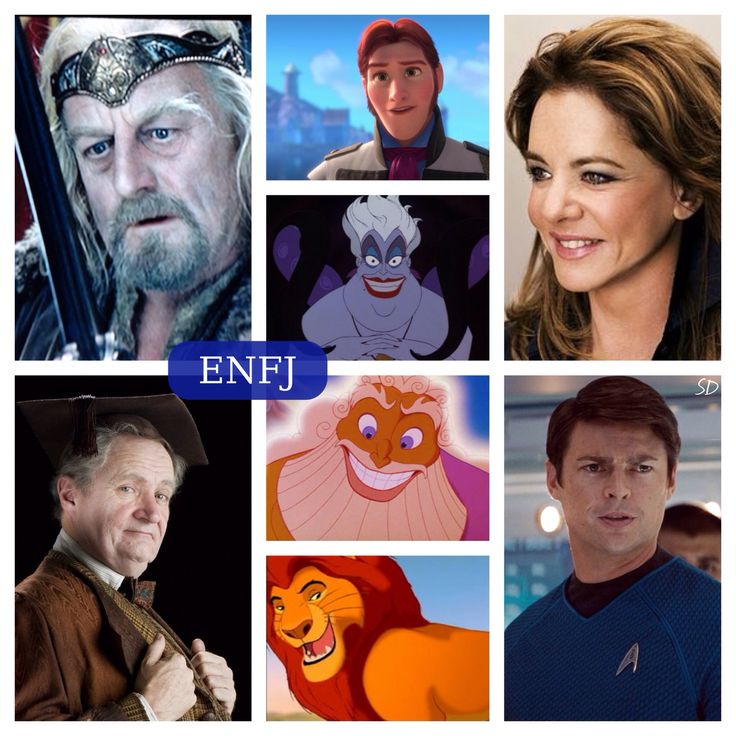 These types have a skill at understanding complex meanings and grasping underlying themes and patterns. They trust their insights to guide them in the right direction and to help them decipher the background processes at work under the surface of events. With their big picture vision and empathy, they are often emotionally insightful, compassionate, and driven. Personal growth and improvement are a large focus of their lives and they are rarely content to be stagnant.
These types have a skill at understanding complex meanings and grasping underlying themes and patterns. They trust their insights to guide them in the right direction and to help them decipher the background processes at work under the surface of events. With their big picture vision and empathy, they are often emotionally insightful, compassionate, and driven. Personal growth and improvement are a large focus of their lives and they are rarely content to be stagnant.
Gandalf the Grey (The Lord of the Rings), Dumbledore (Harry Potter), Amelie, Atticus Finch (To Kill A Mockingbird), Galadriel (The Lord of the Rings), Jane Eyre, Sayuri (Memoirs of a Geisha), Will Graham (Red Dragon), Holden Ford (Mindhunter), Remus Lupin (Harry Potter), Sydney Chambers (Grantchester), Sara Crewe (A Little Princess), Abbe Faria (The Count of Monte Cristo), Agnes Wickfield (David Copperfield), Tamayo (Kimetsu no Yaiba “Demon Slayer”), Kagaya Ubuyashiki (Kimetsu no Yaiba “Demon Slayer”), Itachi Uchiha (Naruto), Armin Arlert (Attack on Titan), Siddhartha, R’As Al Ghul (Batman Series), Louise Banks (Arrival), Lorraine Warren (The Conjuring), Malcolm Crowe (The Sixth Sense), Izuku Midoriya (My Hero Academia).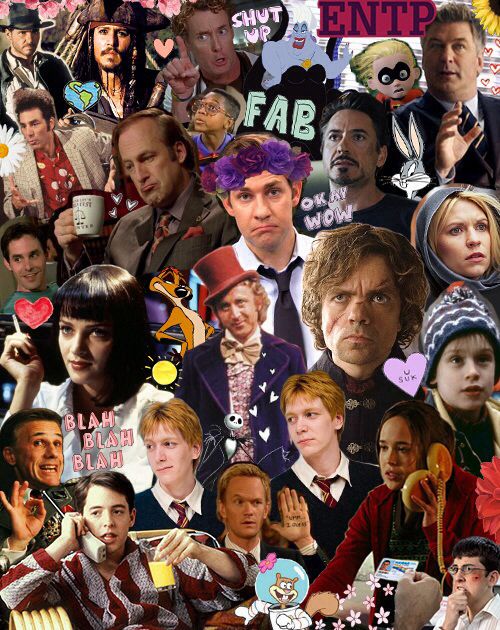
Read This Next: 24 Signs That You’re an INFJ, the “Mystic” Personality Type
The INTJ “Strategist” – Independent/Rational/InsightfulFrom left to right: Kai Chisaki “Overhaul” (My Hero Academia), Petyr Baelish (Game of Thrones), Ender Wiggin (Ender’s Game), Fitzwilliam Darcy (Pride and Prejudice), Thranduil (The Hobbit), Lisbeth Salander (The Girl with the Dragon Tattoo)
INTJs are global thinkers with an eye on the big picture and future possibilities. Deeply insightful, they have a knack for reading between-the-lines and detecting underlying meanings and patterns. These types love complex challenges and theoretical and abstract topics. They use their thinking side to assess everything critically and quickly identify solutions to problems. Both philosophical and rational, INTJs trust their insights and opinions and aim to understand the underlying meaning of all things.
Fictional INTJs:Amy Dunne (Gone Girl), Artemis Fowl, Saruman (The Lord of the Rings), Thranduil (The Hobbit), Ender Wiggin (Ender’s Game), Dracula, Caleb Trask (East of Eden), Heinrich Faust (Faust), Elrond (Lord of the Rings), Annabeth Chase (Percy Jackson and the Olympians), Fitzwilliam Darcy (Pride and Prejudice), George Warleggan (Poldark), Kai Chisaki “Overhaul” (My Hero Academia), Petyr Baelish (Game of Thrones), Bruce Wayne (Batman), Lisbeth Salander (The Girl with the Dragon Tattoo), Rowena Ravenclaw (Harry Potter), Captain Ahab (Moby Dick), Hannibal Lecter (The Silence of the Lambs), Phileas Fogg (Around the World in 80 Days), Sir Reginald Hargreeves (The Umbrella Academy), Lelouch vi Britannia (Code Geass: Lelouch of the Rebellion)
Read This Next: 24 Signs That You’re an INTJ, the “Strategist” Personality Type
The ESFP “Champion” – Adventurous/Individualistic/SpontaneousFrom left to right: Ron Weasley (Harry Potter), Finnick Odair (The Hunger Games), Mina Ashido (My Hero Academia), Peregrine Took (The Lord of the Rings), Steve Harrington (Stranger Things), Daisy Buchanan (The Great Gatsby).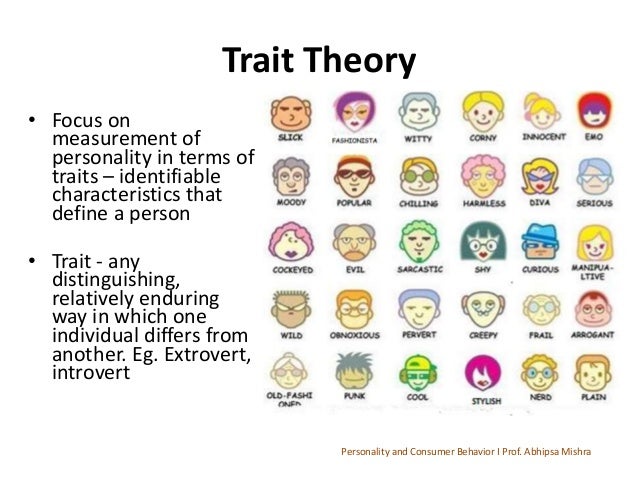
Gregarious, enthusiastic, and fun-loving, ESFPs believe in seizing the day and making the most of each moment. These types are highly observant and quick to respond to sudden changes in their environment. They enjoy working alongside others to learn new skills or make something happen. They often have a restless, adventurous streak and enjoy being active as much as possible. When it comes to decisions, ESFPs are guided by their personal values and individual moral code.
Fictional ESFPs:Ron Weasley (Harry Potter), Alexei Vronsky (Anna Karenina), Kitty Fane (The Painted Veil), Daisy Buchanan (The Great Gatsby), Lydia Bennet (Pride and Prejudice), Peregrine Took (Lord of the Rings), Fred (A Christmas Carol), Felicity Merriman (American Girl Character), Amy March (Little Women), Percy Jackson (Percy Jackson and the Olympians), Francis Poldark (Poldark), Dorian Grey (The Picture of Dorian Gray), Mina Ashido (My Hero Academia), Present Mike (My Hero Academia), Yuga Aoyama (My Hero Academia), Zenitsu Agatsuma (Kimetsu no Yaiba “Demon Slayer”), Naruto Uzuaki (Naruto), Steve Harrington (Stranger Things), Kallen Kozuki (Code Geass: Lelouch of the Rebellion), Finnick Odair (The Hunger Games), Theon Greyjoy (Game of Thrones), Oberyn Martell (Game of Thrones), Robert Baratheon (Game of Thrones).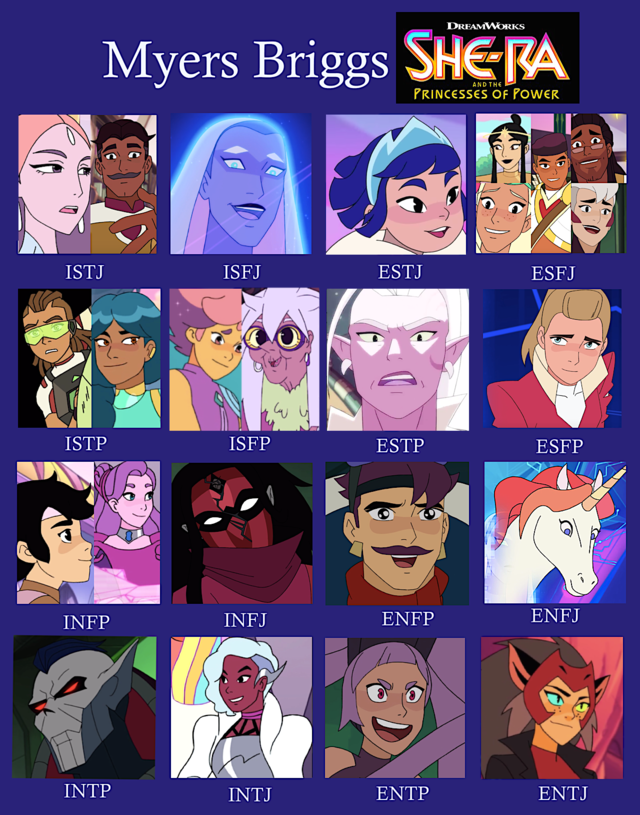
From left to right: Rebecca Sharp (Vanity Fair), Midnight (My Hero Academia), Tyler Durden (Fight Club), Jamie Lannister (Game of Thrones), Aquaman, Gimli (Lord of the Rings)
ESTPs have a strong need for action and a desire to be spontaneous. They have a pragmatic, flexible approach to life and enjoy solving problems and responding to life as it happens. More than most types, they stay focused on the here and now so that they can react quickly to any surprise or information that comes their way. These types have analytical, rational minds and a straightforward approach to life. They tend to learn by doing, plunging headlong into experiences and learning as they go.
Fictional ESTPs:Tyler Durden (Fight Club), Frank Abagnale, Jr. (Catch Me If You Can), Bigwig (Watership Down), Jamie Lannister (Game of Thrones), Catherine Earnshaw (Wuthering Heights), James Potter (Harry Potter), Khal Drogo (Game of Thrones), Lestat de Lioncourt (Interview with the Vampire), Gimli (Lord of the Rings), Rebecca Sharp (Vanity Fair), Frank Churchill (Emma), Caroline Penvenen (Poldark), Robinson Crusoe, Phinks (Hunter X Hunter), Nemuri Kayama “Midnight” (My Hero Academia), Inosuke Hashibira (Kimetsu no Yaiba “Demon Slayer”), Envy (Fullmetal Alchemist: Brotherhood), Billy Hargrove (Stranger Things), Merida (Brave), Bronn (Game of Thrones), Chuuya Nakahara (Bungou Stray Dogs), James “Sawyer” Ford (Lost), Arthur Curry “Aquaman” (Aquaman), Tanaka Ryunosuke (Haikyuu!!), Joanna Mason (The Hunger Games), Clarissa LaRue (Percy Jackson and the Olympians).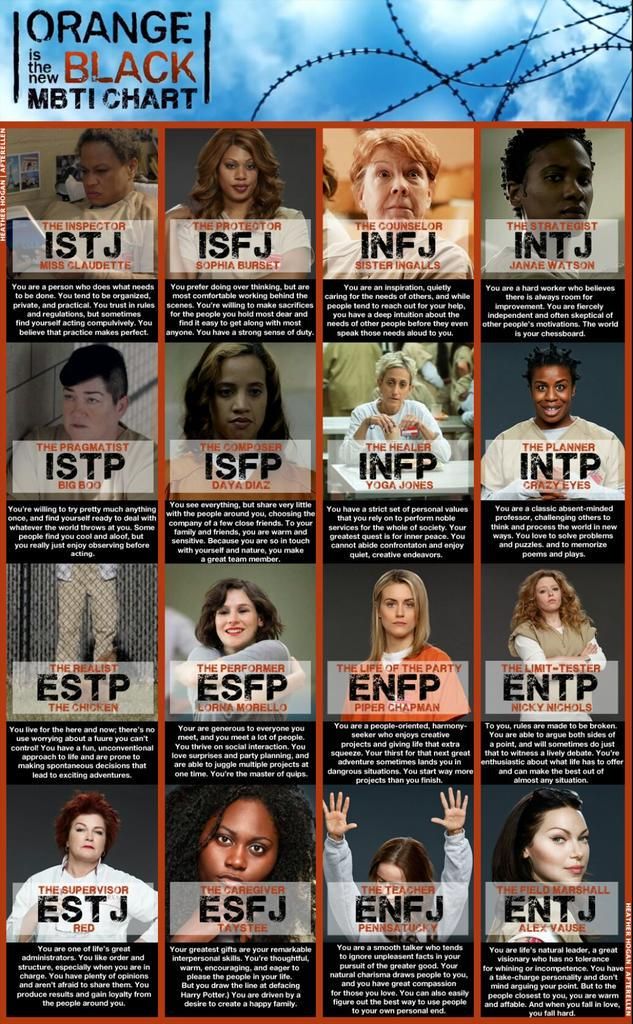
From left to right: Claire Fraser (Outlander), Rose Dewitt Bukater (Titanic), Eleven (Stranger Things), Cinna (The Hunger Games), Jon Snow (Game of Thrones), Eowyn (Lord of the Rings).
ISFPs want the freedom to pursue their own course in life, set their own schedule, and live according to their personal values. These types crave freedom for themselves and want others to enjoy freedom as well. They are typically sensitive, kind, and gentle and crave a life that is meaningful and personally rewarding. They balance this with a realistic, practical, and factual outlook on life. Like all Sensing-Perceivers, ISFPs can respond quickly to changes in their environment and are usually adept at noticing details.
Fictional ISFPs:Lady Sybil Crawley (Downton Abbey), Jacob Black (Twilight), Claire Fraser (Outlander), Princess Buttercup (The Princess Bride), Cinna (The Hunger Games), Arwen (The Lord of the Rings), Liesel Meminger (The Book Thief), Catherine Morland (Northanger Abbey), Eowyn (The Lord of the Rings), Demelza Poldark (Poldark), Fantine (Les Miserables), Chizome Akaguro “Stain” (My Hero Academia), Jane Ives Hopper “Eleven” (Stranger Things), Jonathan Byers (Stranger Things), Jon Snow (Game of Thrones), Eren Yeager (Attack on Titan), Rose Dewitt Bukater (Titanic), Isabella “Bella” Swan (Twilight), Yuichiro Hyakuya (Seraph of the End), Baby (Baby Driver), Edmond Dantes (The Count of Monte Cristo), Shoto Todoroki (My Hero Academia).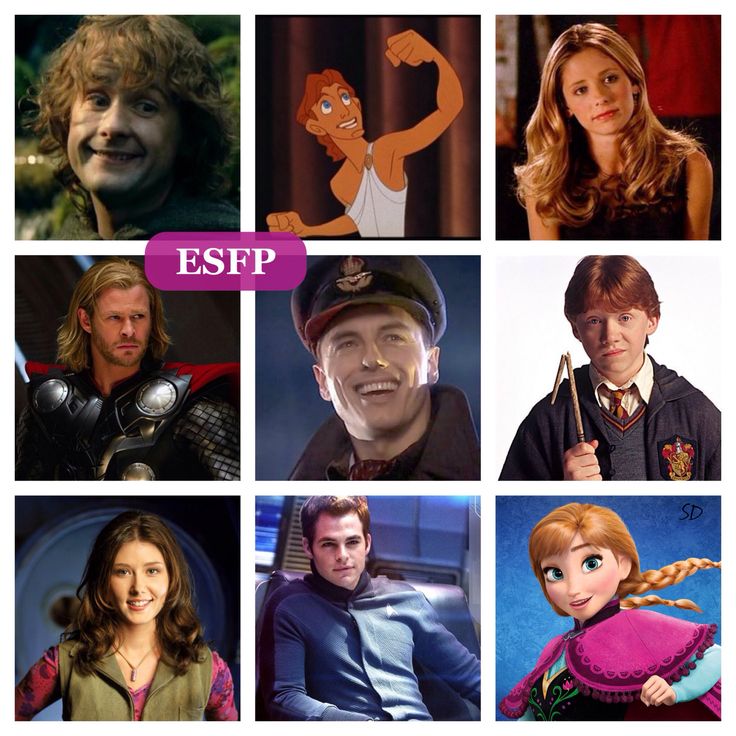
From left to right: Arya Stark (Game of Thrones), Jason Bourne (The Bourne Identity), Shoto Aizawa “Eraserhead” (My Hero Academia), Levi Ackerman (Attack on Titan), Jessica Jones, Jace Herondale (Shadowhunters)
ISTPs are extremely attuned to the moment and can quickly size-up a situation and get to the core of a problem. These types are interested in knowing how and why things work and are usually fascinated by hands-on pursuits like crafting, sports, or even playing musical instruments. Realists at the core, ISTPs trust facts over feelings and try to solve problems as efficiently as possible. Like all Sensing-Perceivers, ISTPs crave freedom and autonomy and rebel under a lot of micro-management or strict rules.
Fictional ISTPs:Jason Bourne (The Bourne Identity), John Wick (John Wick), Bard (The Hobbit), Jace Herondale (Shadowhunters), Alex Fierro (Magnus Chase and the Gods of Asgard), Jean-Baptiste Grenouille (Perfume), Kyoka Jirou “Earphone Jack” (My Hero Academia), Shoto Aizawa “Eraserhead” (My Hero Academia), Levi Ackerman (Attack on Titan), Arya Stark (Game of Thrones), Natasha Romanoff “Black Widow” (The Avengers), Saitama (One Punch Man), Clint Barton “Hawkeye” (The Avengers), Max Mayfield (Stranger Things), Geralt of Rivera (The Witcher), Sandor “The Hound” Clegane (Game of Thrones), Daryl Dixon (The Walking Dead), Shinya Kogami (Psycho-Pass), Jessica Jones, Diego Hargreeves (The Umbrella Academy).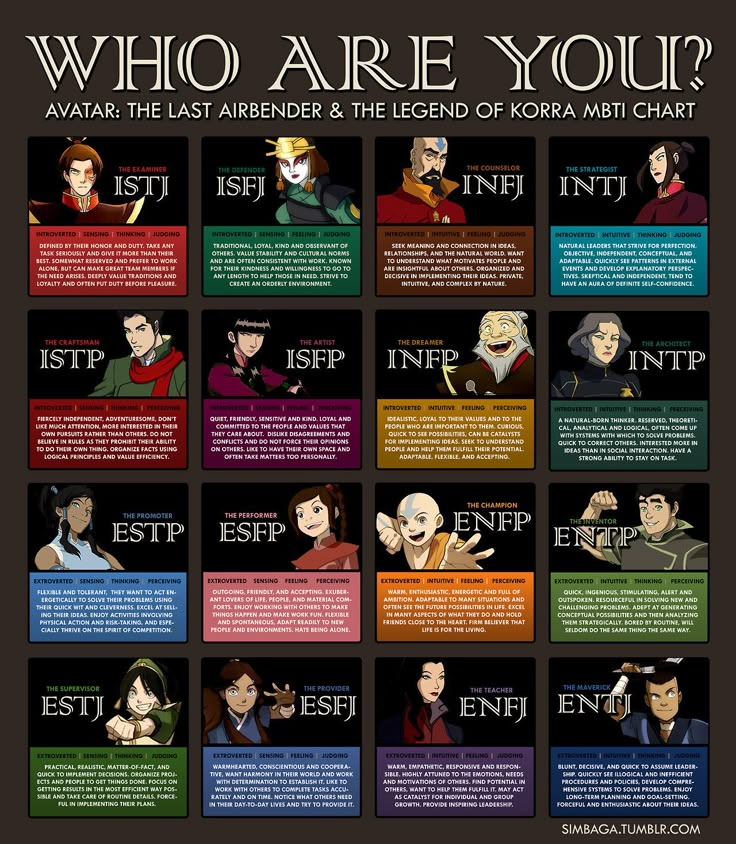
From left to right: Sakura Haruno (Naruto: Shippenden), Anna Smith (Downton Abbey), Molly Weasley (Harry Potter), Bilbo Baggins (The Lord of the Rings), Sansa Stark (Game of Thrones), Effie Trinket (The Hunger Games)
ESFJs have a gift for understanding the physical and emotional needs of the people around them. They are adept at organizing people to complete a task in a timely manner. Because they are more focused on the concrete than the abstract, they have a down-to-earth, grounded aura. When meeting an ESFJ, you’ll likely notice their warm, tactful nature and their natural love of people. These types enjoy making people happy and are hurt by insensitivity or indifference. When it comes to getting a job done, ESFJs are decisive, consistent, and methodical.
Fictional ESFJs:Effie Trinkett (The Hunger Games), Margaret Hale (North and South), Bilbo Baggins (The Hobbit), Anna Smith (Downton Abbey), Wendy Darling (Peter Pan), Mrs.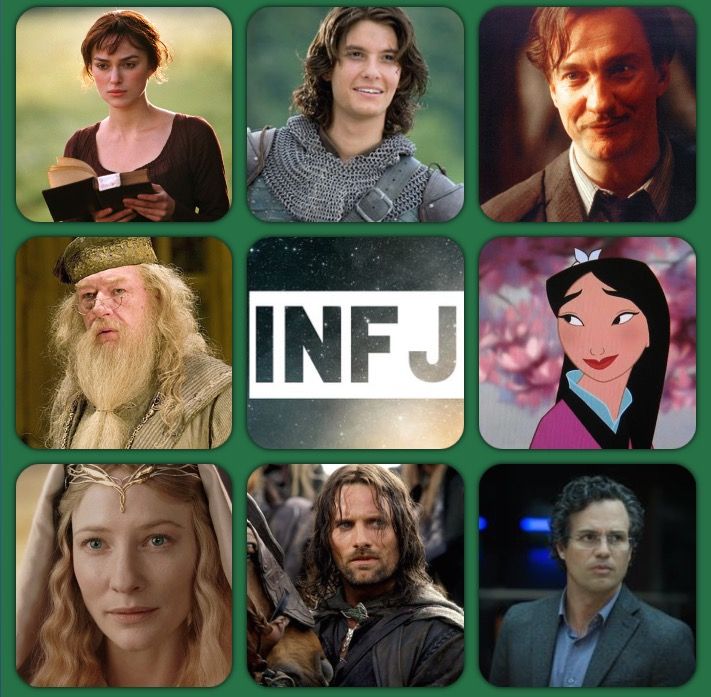 Bennett (Pride and Prejudice), Elizabeth Poldark (Poldark), Lucie Manette (A Tale of Two Cities), Sansa Stark (Game of Thrones), Sakura Haruno (Naruto: Shippenden), Nancy Wheeler (Stranger Things), Molly Weasley (Harry Potter), Cedric Diggory (Harry Potter), Bob Newby (Stranger Things), Allison Hargreeves (The Umbrella Academy), Maka Albarn (Soul Eater).
Bennett (Pride and Prejudice), Elizabeth Poldark (Poldark), Lucie Manette (A Tale of Two Cities), Sansa Stark (Game of Thrones), Sakura Haruno (Naruto: Shippenden), Nancy Wheeler (Stranger Things), Molly Weasley (Harry Potter), Cedric Diggory (Harry Potter), Bob Newby (Stranger Things), Allison Hargreeves (The Umbrella Academy), Maka Albarn (Soul Eater).
From left to right: Hermione Granger (Harry Potter), Mary Poppins, Peter Pevensie (The Chronicles of Narnia), Hopper (Stranger Things), Endeavor (My Hero Academia), Boromir (The Lord of the Rings)
ESTJs value competence, efficiency, and results and are skilled at organizing a task to make sure it’s accomplished as quickly as possible. These types enjoy interacting with others as long as they’re not procrastinating or wasting time. Typically assertive and logical, they work out problems objectively by focusing on the facts and details at hand.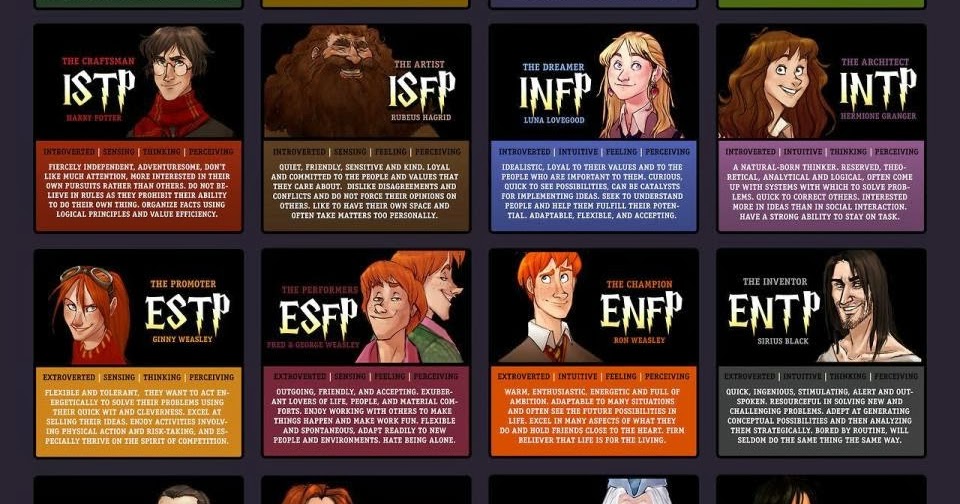 ESTJs tend to take naturally to leadership and are good at projecting the steps needed to get something done. They are also skilled at managing logistics and catching errors before they create major problems.
ESTJs tend to take naturally to leadership and are good at projecting the steps needed to get something done. They are also skilled at managing logistics and catching errors before they create major problems.
Hermione Granger (Harry Potter), Rachel Lynde (Anne of Green Gables), Minerva McGonagall (Harry Potter), Peter Pevensie (The Chronicles of Narnia), Rabbit (Winnie the Pooh), Violet Crawley (Downton Abbey), Cersei Lannister (Game of Thrones), Boromir (Lord of the Rings), Leia Organa (Star Wars), Endeavor (My Hero Academia), General Li Shang (Mulan), Jack Shephard (Lost), Yubaba (Spirited Away), Tatsumaki (One Punch Man), Cornelia li Brittania (Code Geass: Lelouch of the Rebellion), Mary Poppins, Dolores Umbridge (Harry Potter), King Triton (The Little Mermaid), Shirley “Shiri” Crain (The Haunting of Hill House), Hopper (Stranger Things).
The ISFJ “Protector” – Nurturing/Grounded/Detail-OrientedFrom left to right: Steve Rogers (Captain America), Jennifer Honey (Matilda), Beth March (Little Women), Charlie Buckets (Charlie and the Chocolate Factory), Sophie Hatter (Howl’s Moving Castle), Clay Jensen (13 Reasons Why)
Dependable and considerate, ISFJs are deeply committed to protecting the people and traditions they love.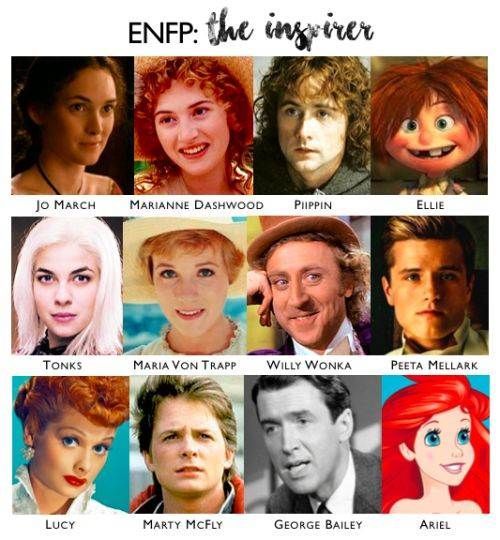 Their grounded, down-to-earth demeanor puts people at ease, and their sensitive and thoughtful spirit is usually a source of comfort. ISFJs aren’t afraid to weather tough storms if it means they are protecting the people they care about. Their thorough, detail-oriented nature means that they rarely leave a task unfinished or sloppy.
Their grounded, down-to-earth demeanor puts people at ease, and their sensitive and thoughtful spirit is usually a source of comfort. ISFJs aren’t afraid to weather tough storms if it means they are protecting the people they care about. Their thorough, detail-oriented nature means that they rarely leave a task unfinished or sloppy.
Clay Jensen (13 Reasons Why), Amy Dorritt (Little Dorritt), Steve Rogers “Captain America” (Captain America), Dr. James Watson (Sherlock), Arthur Dent (The Hitchhiker’s Guide to the Galaxy), Miss Havisham (Great Expectations), Narcissa Malfoy (Harry Potter), Matthew Cuthbert (Anne of Green Gables), Meg March (Little Women), Anne Elliot (Persuasion), Samwise Gamgee (The Lord of the Rings), Edward Ferrars (Sense & Sensibility), Kirsten Larson (The American Girls Series), Amelia Sedley (Vanity Fair), Charlie Buckets (Charlie and the Chocolate Factory), Jonathan Harker (Dracula), Elizabeth “Beth” March (Little Women), Miss Jennifer Honey (Matilda), Grover Underwood (Percy Jackson and the Olympians), Verity Poldark (Poldark), Cosette (Les Miserables), Sophie Hatter (Howl’s Moving Castle), Mayuri Shiina (SteinsGate).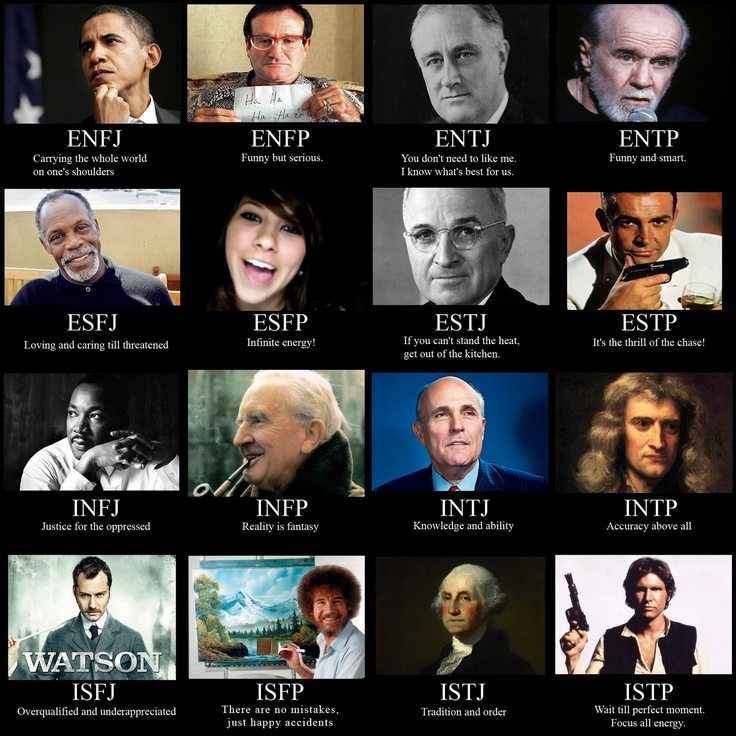
From left to right: John Thornton (North and South), Eomer (The Lord of the Rings), Marilla Cuthbert (Anne of Green Gables), Harry Potter (The Harry Potter Series), Susan Pevensie (The Chronicles of Narnia), Eddard Stark (Game of Thrones)
Detail-oriented and down-to-earth, ISTJs have a careful eye on tasks and procedures to make sure they’re done right. These types are also deeply loyal to their loved ones and beliefs, standing up against any adversary that would threaten them. Their practical, sensible outlook on life makes them a trusted source of information. Unlike some other types, they’re not likely to bend the facts or manipulate people. They trust facts over hunches and try to stay detached and objective when a decision has to be made so that they will be as fair as possible.
Fictional ISTJs:Harry Potter (Harry Potter Series), Tenya Iida (My Hero Academia), Bill Tench (Mindhunter), John Bates (Downton Abbey), Susan Pevensie (The Chronicles of Narnia), Bathsheba Everdene (Far from the Madding Crowd), John Thornton (North and South), Marilla Cuthbert (Anne of Green Gables), Eddard Stark (Game of Thrones), Eomer (The Lord of the Rings), Theoden (The Lord of the Rings), Alexei Karenin (Anna Karenina), Inspector Javert (Les Miserables), Dr.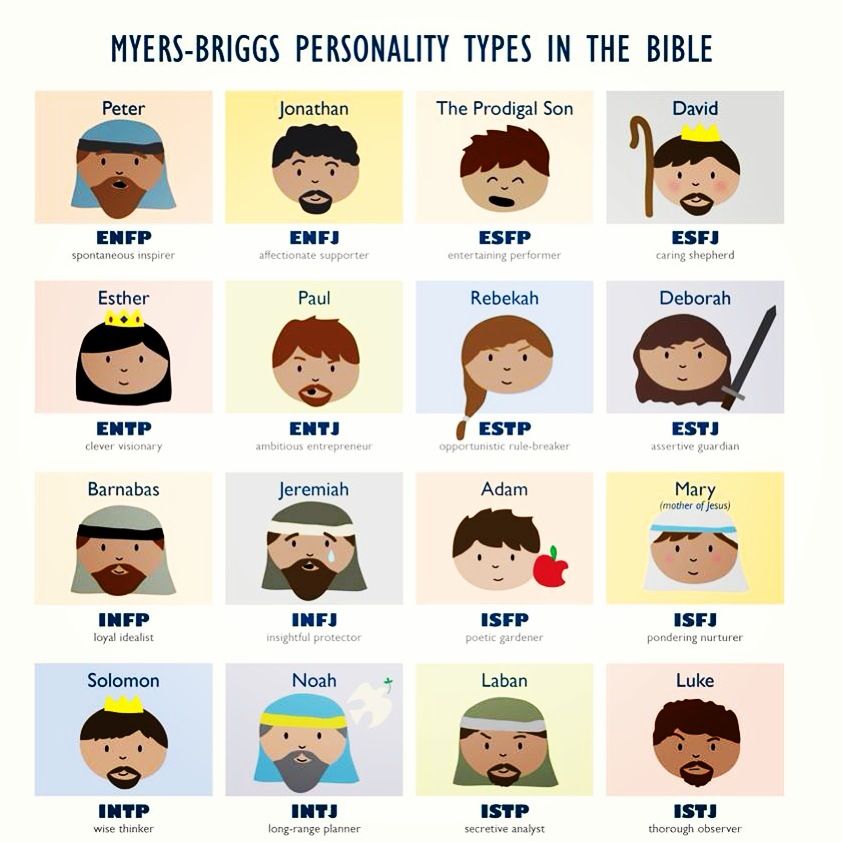 Alan Grant (Jurassic Park), Thorin Oakenshield (The Hobbit), Ebenezer Scrooge (A Christmas Carol), George Knightley (Emma), Eudora Patch (The Umbrella Academy), Luther Hargreeves (The Umbrella Academy).
Alan Grant (Jurassic Park), Thorin Oakenshield (The Hobbit), Ebenezer Scrooge (A Christmas Carol), George Knightley (Emma), Eudora Patch (The Umbrella Academy), Luther Hargreeves (The Umbrella Academy).
What Are Your Thoughts?
Do you have any other fictional characters you’d recommend? Do you agree with your characters? Let us know in the comments!
Find out more about your personality type in our eBooks, Discovering You: Unlocking the Power of Personality Type, The INFJ – Understanding the Mystic, and The INFP – Understanding the Dreamer. You can also connect with me via Facebook, Instagram, or Twitter!
- More
The Myers-Briggs Types of 202 Fictional Characters
This content contains affiliate links. When you buy through these links, we may earn an affiliate commission.
For those of you who are not familiar with Myers-Briggs, it’s a personality profiling system based on Jung’s typological theory that was developed by Katherine Cook Briggs and her daughter, Isabel Briggs Myers. In the Myers-Briggs typeology system, there are sixteen personality types consisting of four letters: E for extrovert or I for introvert, S for sensor or N for intuitive, T for thinker or F for feeler, and P for perceiver or J for judger. You can read more about Myers-Briggs here and find books about it here. Just for fun, here are the Myers-Briggs characters: types for a whole lot of fictional characters. (For more MBTI fun, check out my post “The Myers-Briggs Types of 101 Famous Authors.”)
Organized • Group Oriented • Focused • Conventional • Leader
ESTJs are traditionalists who like to take charge of situations. They are pragmatic and like things to be organized and clear. They are driven by a need to analyze and bring order to the world. ESTJs comprise approximately 9% of the general population, 11% of men, and 6% of women.
ESTJ characters include Rachel Lynde (Anne of Green Gables), Thresh (The Hunger Games), Vernon Dursley, Dolores Umbridge, Minerva McGonagall, and Hermione Granger (Harry Potter), Cersei Lannister (Game of Thrones), Mycroft Holmes (Sherlock Holmes), Estella Havisham (Great Expectations), and Peter Pevensie (The Chronicles of Narnia).
Organized • Outgoing • Affectionate • Open • Easy to Read
ESFJs are outgoing and community-minded people who value loyalty, dependability, and practicality. They are driven by an active and intense caring about people along with a strong desire to bring harmony to their relationships. ESFJs make up about 12% of the general population, 17% of women, and 8% of men.
ESFJ characters include Molly Weasley and Petunia Dursley (Harry Potter), Rabbit (Winnie the Pooh), Esme and Carlisle Cullen (Twilight), Margaret Hale (North and South), Sam Dutton (The Perks of Being a Wallflower), Effie Trinket (The Hunger Games), Diana Barry (Anne of Green Gables), Wendy Darling (Peter Pan), Mia Thermopolis (The Princess Diaries), Alfred Pennyworth (Batman), and Bilbo Baggins (The Hobbit).
Polite • Easily Offended • Timid • Dutiful • Private
ISFJs are quiet, caring, and dependable people who have a strong sense of personal responsibility. They are realistic and excellent organizers. ISFJs make up about 14% of the general population, 19% of women, and 8% of men.
Fictional ISFJs include Melanie Hamilton Wilkes (Gone with the Wind), Ophelia (Hamlet), Dr. Watson (Sherlock Holmes), Arthur Dent (The Hitchhiker’s Guide to the Galaxy), Miss Havisham (Great Expectations), Amy Dorrit (Little Dorrit), Narcissa Malfoy (Harry Potter), Susie Salmon (The Lovely Bones), Gilbert Blythe and Matthew Cuthbert (Anne of Green Gables), Meg March (Little Women), Anne Elliot (Persuasion), Steve Rogers (Captain America), Balin (The Hobbit), Samwise Gamgee (The Lord of the Rings), and Edward Ferrars (Sense and Sensibility).
Responsible • Planner • Private • Perfectionist • Detail Oriented
ISTJs are logical pragmatists with a strong sense of personal responsibility. They take their work seriously and pay great attention to detail. ISTJs comprise approximately 12% of the general population, 16% of men, and 7% of women.
Fictional ISTJs include Susan Pevensie (The Chronicles of Narnia), Bathsheba Everdene (Far from the Madding Crowd), Gilbert Norrell (Johnathan Strange and Mr. Norrell), Jeanine Matthews and Tobias Eaton (Divergent), Edward Cullen and Charlie Swan (Twilight), Walter Fane (The Painted Veil), John Thornton (North and South), Charlie Kelmeckis (The Perks of Being a Wallflower), Katniss Everdeen (The Hunger Games), Jon Snow and Eddard Stark (Game of Thrones), Marilla Cuthbert (Anne of Green Gables), Éomer and Théoden (The Lord of the Rings) Alexei Karenin (Anna Karenina), Inspector Javert (Les Misérables), Dr.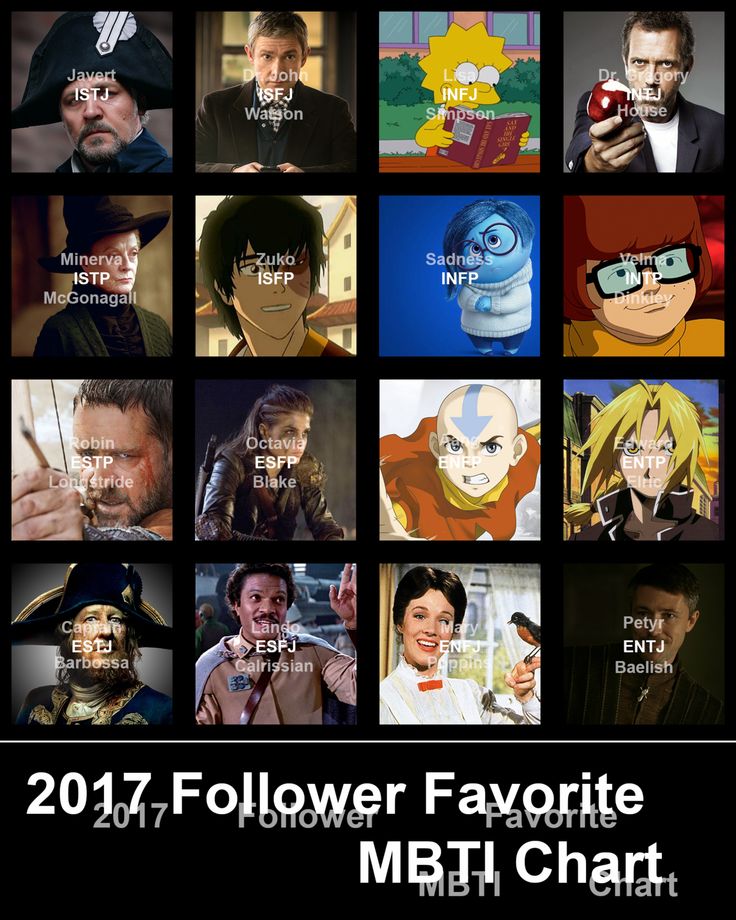 Alan Grant (Jurassic Park), John Jasper (The Mystery of Edwin Drood), and Thorin Oakenshield (The Hobbit).
Alan Grant (Jurassic Park), John Jasper (The Mystery of Edwin Drood), and Thorin Oakenshield (The Hobbit).
Private • Loner Tendencies • Disorganized • Avoidant • Unemotional
ISTPs are driven by a desire to understand how things work. They are logical and realistic people who enjoy solving problems in a hands-on way. ISTPs make up about 5% of the general population, 9% of men, and 2% of women.
ISTP characters include Bard and Kili (The Hobbit), Merry Brandybuck and Aragorn (The Lord of the Rings), Tris Prior (Divergent), Peter Pettigrew (Harry Potter), Catwoman (Batman), Jace Wayland (Mortal Instruments), Jacob Black (Twilight), and Gwendolen Harleth (Daniel Deronda).
Disorganized • Modest • Suggestible • Indecisive • Guarded
ISFPs are the quintessential free spirit. They feel deeply and often have an adventurous approach to life.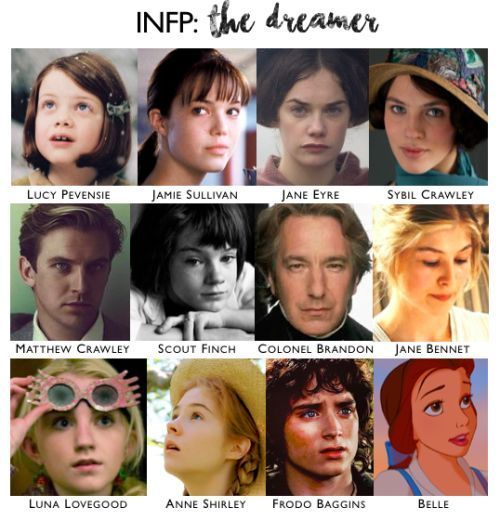 They are quiet, adaptable, and compassionate. ISFPs make up about 9% of the general population, 10% of women, and 8% of men.
They are quiet, adaptable, and compassionate. ISFPs make up about 9% of the general population, 10% of women, and 8% of men.
Fictional ISFPs include Edmund Pevensie (The Chronicles of Narnia), Sydney Chambers (Grantchester), Claire Fraser (Outlander), Buttercup (The Princess Bride), Cinna (The Hunger Games), Dobby and Harry Potter (Harry Potter), Radagast the Brown (The Hobbit), Arwen, Éowyn, and Legolas (The Lord of the Rings), Liesel Meminger (The Book Thief), Pip (Great Expectations), and Catherine Morland (Northanger Abbey).
Outgoing • Conventional • Talkative • Spontaneous • Emotional
ESFPs are enthusiastic about having new experiences and meeting new people. They are warm and adaptable realists who prefer to go with the flow. ESFPs comprise approximately 9% of the general population, 10% of women, and 7% of men.
ESFP characters include Alexei Vronsky (Anna Karenina), Dudley Dursley, Ron Weasley, and Sirius Black (Harry Potter), Kitty Fane (The Painted Veil), Daisy Buchannan (The Great Gatsby), Rue (The Hunger Games), Lydia Bennet (Pride and Prejudice), Jamie Lannister (Game of Thrones), and Peregrin Took (The Lord of the Rings).
Content • Self-Confident • Outgoing • Open • Decisive
ESTPs are enthusiastic adventurers and realists who accept the world as it is and focus on enjoying new activities and challenges. ESTPs make up about 4% of the general population, 6% of men, and 3% of women.
Fictional ESTPs include Heathcliffe and Catherine Earnshaw (Wuthering Heights), James Potter, Ginny Weasley, and Draco Malfoy (Harry Potter), Inigo Montoya (The Princess Bride), Khal Drogo (Game of Thrones), Lestat (Interview with the Vampire), Rhett Butler and Scarlett O’Hara (Gone with the Wind), Emmett Cullen (Twilight), and Gimli (The Lord of the Rings).
Easy Going • Open • Disorganized • Adventurous • Insensitive
ENTPs love new ideas and possibilities and are excited by innovation. They are energetic, enthusiastic, and spontaneous people with a deep need to understand the world around them. ENTPs comprise approximately 3% of the general population, 4% of men, and 2% of women.
ENTP characters include Helena (A Midsummer Night’s Dream), Mark Watney (The Martian), Tyler Durden (Fight Club), Benedick (Much Ado About Nothing), Augustus Waters (The Fault in Our Stars), Dumbledore, Fred and George Weasley (Harry Potter), Henry Tinley (Northanger Abbey), and Tyrion Lannister (Game of Thrones).
Loner • Disorganized • Observer • Private • Detached
INTPs have a deep need to make sense of the world and are generally logical, analytical, and emotionally detached. They enjoy new ideas and are adaptable in their lifestyle, if not always their thinking. INTPs comprise approximately 3% of the general population, 5% of men, and 2% of women.
Fictional INTPs incude Pierre Bezukhov (War and Peace), R (Warm Bodies), Nick Carraway (The Great Gatsby), Samwell Tarly (Game of Thrones), Arthur Weasley (Harry Potter), Ian Malcolm (Jurassic Park), Violet Baudelaire (A Series of Unfortunate Events), and Smaug (The Hobbit).
Loner • Observer • Perfectionist • Private • Skeptical
INTJs are idea people, driven by their inner world of possibilities and a deep need to understand the world around them. They are logical, systematic thinkers who enjoy turning their visions into reality. INTJs make up about 2% of the general population, 3% of men, and 1% of women.
Fictional INTJs include Fitzwilliam Darcy (Pride and Prejudice), Hannibal Lecter and Clarice Starling (The Silence of the Lambs), Gandalf, Saruman, and Elrond (The Lord of the Rings), Thranduil (The Hobbit), Professor Moriarty (Sherlock Holmes), Rosencrantz and Guildenstern (Hamlet), Severus Snape (Harry Potter), Amy Dunne (Gone Girl), Ender Wiggin (Ender’s Game), Jay Gatsby (The Great Gatsby), Thomas (The Maze Runner), Caius Marcius (Coriolanus), Jean Valjean (Les Misérables), and Rosa Bud (The Mystery of Edwin Drood).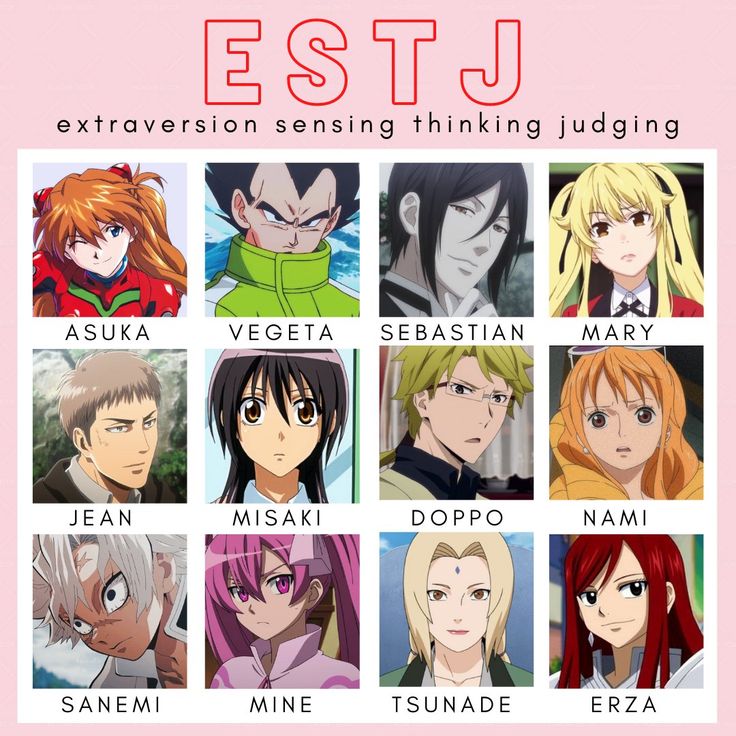
Decisive • Planner • Engaged • Ambitious • Dominant
ENTJs are forceful personalities who excel at conceptual strategy and executing plans. They are future-oriented and natural leaders. ENTJs make up about 2% of the general population, 3% of men, and 1% of women.
Fictional ENTJs include Gale Hawthorne, Johanna Mason, and President Snow (The Hunger Games), Hatsumomo (Memoirs of a Geisha), Miranda Priestly (The Devil Wears Prada), Viserys Targaryn and Tywin Lannister (Game of Thrones) Irene Adler (Sherlock Holmes), Voldemort (Harry Potter), and Edward Rochester (Jane Eyre).
Social • Emotional • Altruistic • Involved • Open
ENFJs care intensely about people and are driven by a need for relational harmony. They tend to be warmly expressive and empathetic people who enjoy helping others reach their potential. ENFJs make up about 3% of the general population, 3% of women, and 2% of men.
Fictional ENFJs include Emma Woodhouse (Emma), Elizabeth Bennet (Pride and Prejudice), Amy March (Little Women), Edmund Bertram (Mansfield Park), John Jarndyce (Bleak House), Boromir (The Lord of the Rings), Anna Karenina (Anna Karenina), Peeta Mellark (The Hunger Games), and Arthur Clennam (Little Dorrit).
Creative • Observer • Avoidant • Cautious • Private
INFJs have an inner world filled with ideas, symbols, and possibilities. They are passionate, idealistic, and have a deep concern for others. INFJs make up about 2% of the general population, 2% of women, and 1% of men.
INFJ characters include Sonmi-451 (Cloud Atlas), Will Graham (Red Dragon), Sayuri (Memoirs of a Geisha), Theodore Lawrence (Little Women), Atticus Finch (To Kill a Mockingbird), Andy Sachs (The Devil Wears Prada), Lord Varys (Game of Thrones), Prince Caspian (The Chronicles of Narnia), Remus Lupin (Harry Potter), Hercule Poirot (Hercule Poirot Mysteries), Georgiana Darcy (Death Comes to Pemberley), and Galadrial (The Lord of the Rings).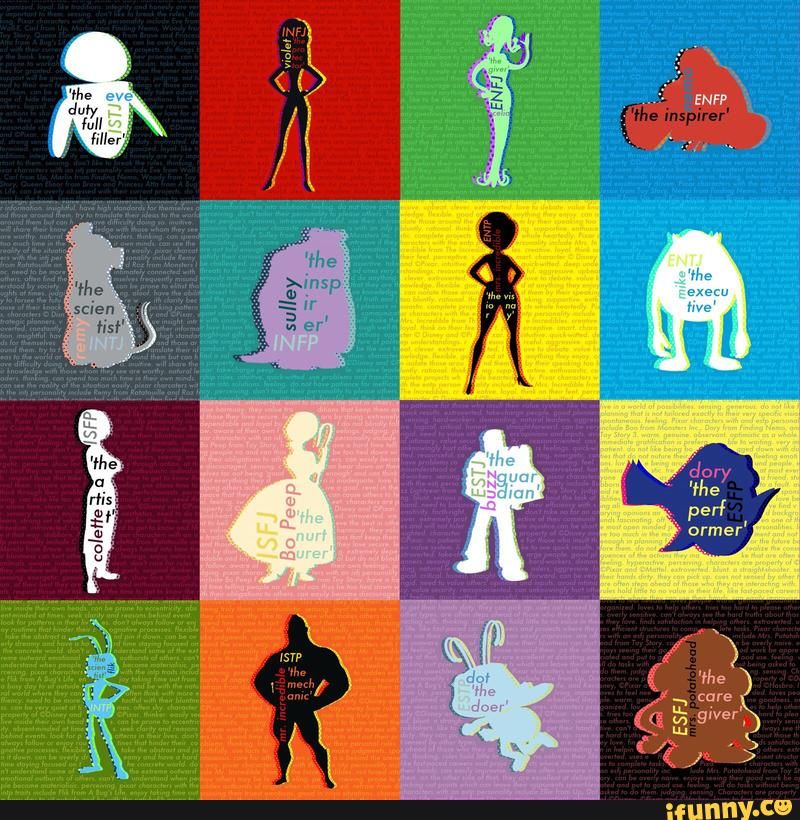
Creative • Idealist • Loner • Disorganized • Avoidant
INFPs are the dreamers of the world. They are deeply idealistic and passionate about their beliefs, ideas, and relationships. INFPs make up about 4% of the general population, 5% of women, and 4% of men.
Fictional INFPs include Anne of Green Gables (Anne of Green Gables), Bill Weasley (Harry Potter), Ashely Wilkes (Gone with the Wind), Coraline Jones (Coraline), Skeeter Phelan (The Help), Jasper Hale and Bella Swan (Twilight), Frodo, Faramir and Sméagol/Gollum (The Lord of the Rings), Frederick Bhaer (Little Women), Scout Finch (To Kill a Mockingbird), Jane Bennet (Pride and Prejudice), Juliet Capulet and Romeo Montague (Romeo and Juliet), Colonel Brandon (Sense and Sensibility), Lady Dedlock (Bleak House), Jamie Sullivan (A Walk to Remember), Lucy Pevensie (The Chronicles of Narnia), and Jane Eyre (Jane Eyre).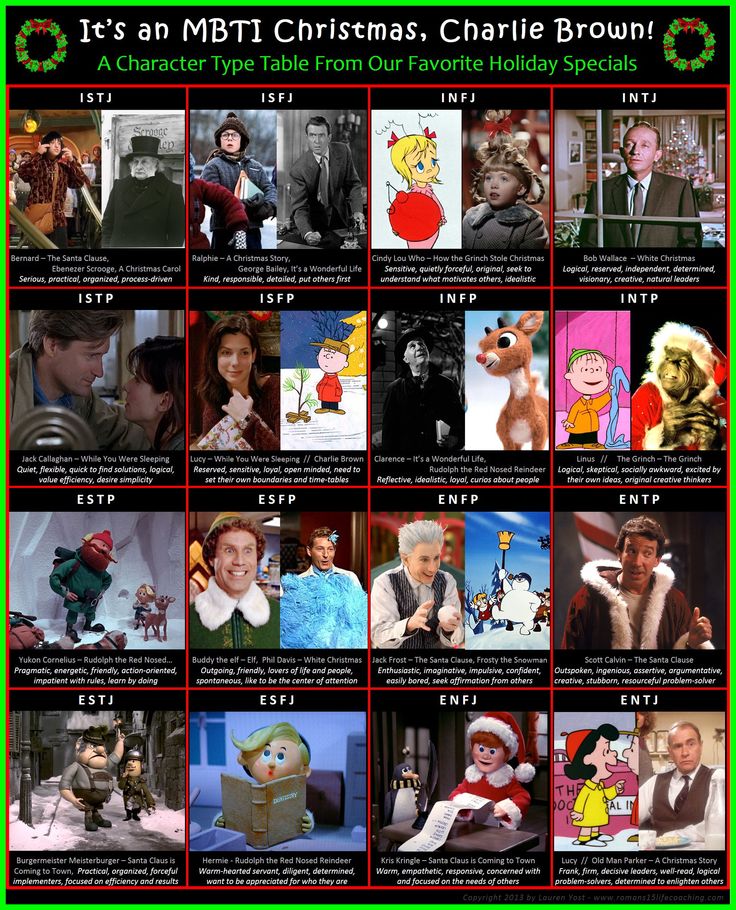
Outgoing • Disorganized • Spontaneous • Irresponsible • Energetic
ENFPs thrive on the new–new people, new activities, and new ideas. They see what is possible and are energetic, enthusiastic, and spontaneous. ENFPs make up about 8% of the general population, 10% of women, and 6% of men.
Fictional ENFPs include Natasha Rostova (War and Peace), Jonathan Strange (Jonathan Strange and Mr. Norrell), Willy Wonka (Charlie and the Chocolate Factory), Horace Slughorn and Nymphadora Tonks (Harry Potter), Josephine March (Little Women), Beatrice (Much Ado About Nothing), Marianne Dashwood, and John Willoughby (Sense and Sensibility).
Note: I referenced the type descriptions at the Center for Applications of Psychological Type, Truity, and SimilarMinds.com. Special thanks to Funky MBTI in Fiction for informing many of my type choices.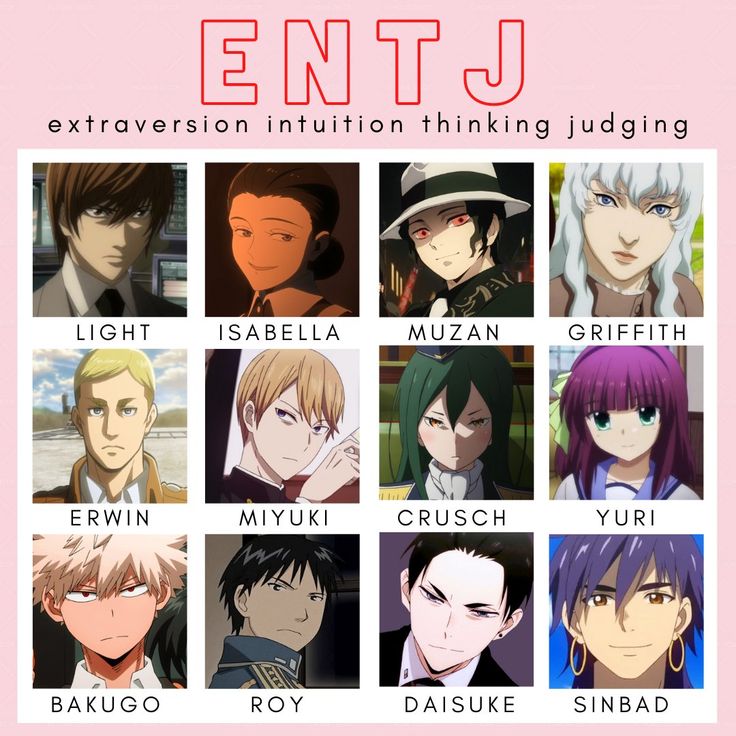
Which Anime Character Are You By Personality Type MBTI - Animania
Find out your personality type by taking a test and see which anime character you look like
The MBTI personality type test has gained a lot of popularity lately, including among celebrities who can take it and report the results to their fans - but anime characters, unfortunately, cannot pass the test on their own, so enthusiasts determine the types of favorite characters based on their behavior in anime.
The typology of fictional characters is always based rather on very careful guesses and can never be 100% accurate. But it's still so interesting to type your favorite characters by analyzing their personality traits and comparing them with your own :)
Don't know what type of personality you have? You can take the test here :)
ENFP – Kaori Miyazono, Shigatsu wa Kimi no Uso (Your Lie in April)
Free-spirited and creative Kaori Miyazono of Shigatsu wa Kimi no Uso exhibits many of the strengths of the ENFP type.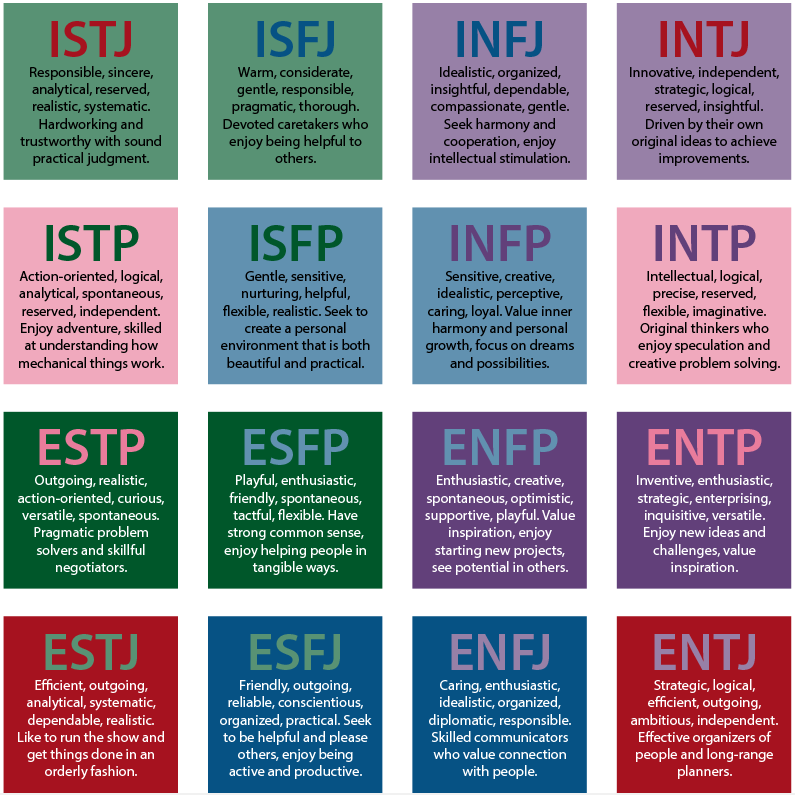 Her free-spirited, rule-breaking musical style infuriates the judges but delights the audience. In typical visceral fashion, Kaori often skips over details or historical interpretations of the score in order to focus on the overall theme and the personal impression she wants to make. She doesn't let anyone lead her astray and has a distinctly individualistic ENFP nature. Her creativity, emotionality and warmth make her a signature ENFP character.
Her free-spirited, rule-breaking musical style infuriates the judges but delights the audience. In typical visceral fashion, Kaori often skips over details or historical interpretations of the score in order to focus on the overall theme and the personal impression she wants to make. She doesn't let anyone lead her astray and has a distinctly individualistic ENFP nature. Her creativity, emotionality and warmth make her a signature ENFP character.
Other ENFP characters: Howl (Howl's Moving Castle), Aang (Avatar: The Last Airbender), Yui (K-On!), Chitanda Eru (Hyouka), Chika Fujiwara (Kaguya-Sama: Love is War)
ENTP - Edward Elric, FullMetal Alchemist
The rebellious and open-minded nature of ENTP is shown by Edward Elric. He can quickly see possibilities in any situation and is excited about difficulties, theories, concepts and problems. This creative and intelligent personality uses extroverted intuition and introverted thinking.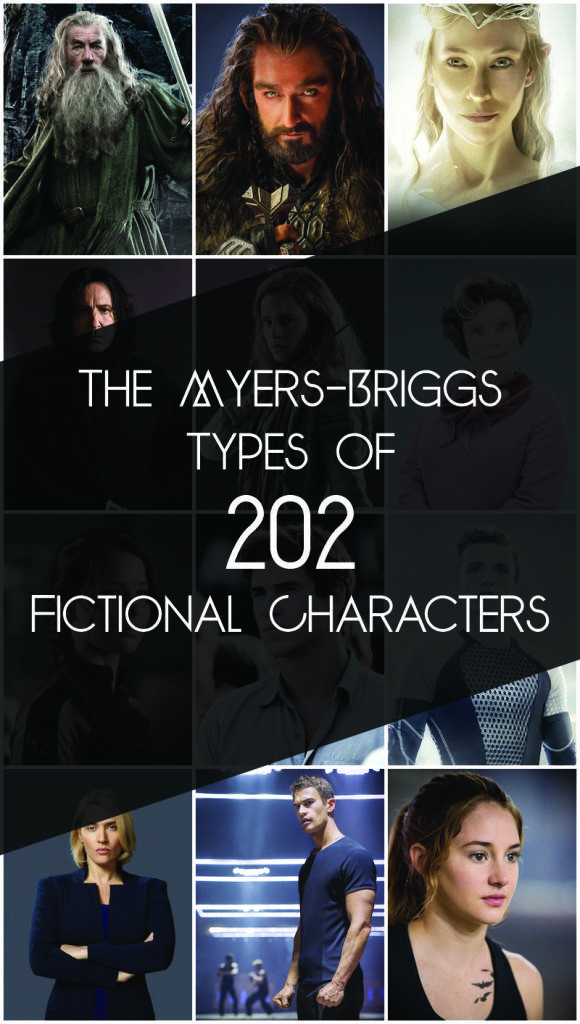 He knows how to break the rules at the right time, and his sharp, gritty sense of humor is something ENTPs are very good at.
He knows how to break the rules at the right time, and his sharp, gritty sense of humor is something ENTPs are very good at.
Other ENTP characters: Mei Hatsume (My Hero Academia), Lloyd Asplund (Code Geass: Lelouch of the Rebellion), Ryuk (Death Note), Rintaro Okabe (Steins;Gate), Bulma (Dragon Ball), Konata Izumi (Lucky Star), Hange Zoe (Attack on Titan).
Infp - Kaneki Ken, Tokyo Ghoul
Most Ken Kanei wants to remain faithful to himself. His biggest fear is losing his identity and going against his moral code. Although all personality types can feel the same to some extent, none of them experience it to the same extent as an INFP (or ISFP). INFPs crave authenticity and personal freedom in every aspect of their lives. They are unwilling to bend or break due to external pressure and this internal struggle is what burdens Ken for most of Tokyo Ghoul .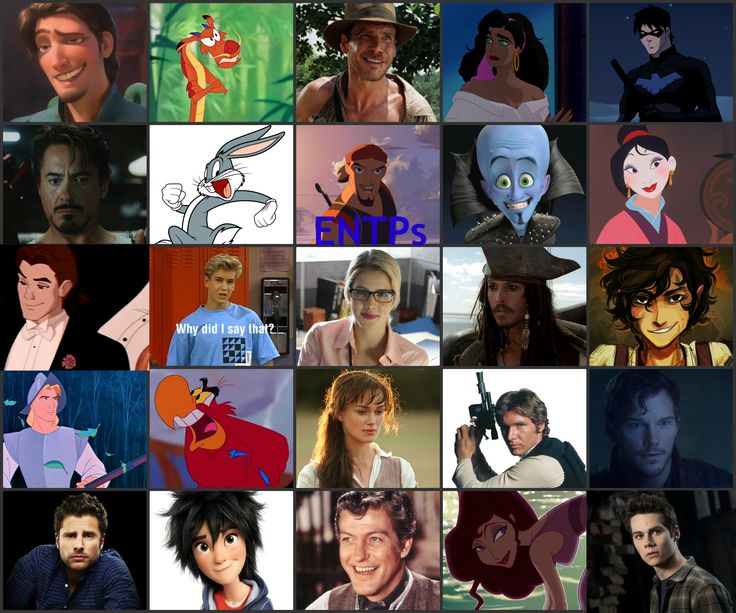 Gentle, shy, and altruistic, he goes to great lengths to protect his loved ones - even putting himself in grave danger for them. His shrewd, deep nature epitomizes the sublime, morally conscious nature of the INFP.
Gentle, shy, and altruistic, he goes to great lengths to protect his loved ones - even putting himself in grave danger for them. His shrewd, deep nature epitomizes the sublime, morally conscious nature of the INFP.
Other INFP characters: Tamaki Amajiki (My Hero Academia), Alphonse Elric (FullMetal Alchemist: Brotherhood), Nagato (Naruto), Krona (Soul Eater), Rakka (Haibane Renmei), Rinko Yamato (Ore Monogatari!), Shinichi Izumi (Parasyte).
INTP - L, Death Note
Highly intelligent but often misunderstood, the INTP type personality exhibits a witty but often misunderstood nature. People tend to underestimate him due to his disheveled appearance and lack of tact, but his analytical skills and strong deduction are astounding. In typical INTP fashion, L has a dry but sharp sense of humor and the ability to put facts together in the most difficult of situations. They are driven by a desire to understand and solve mysteries, and many INTPs will pursue a similar thirst for discovery and truth.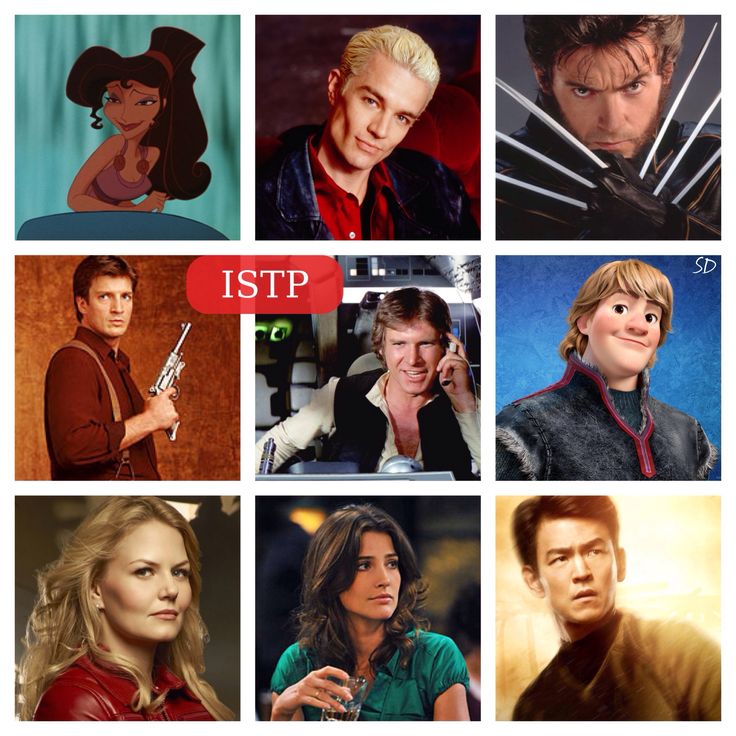
Other INTP Characters: Tsuyu Asui (My Hero Academia), Rampo Edogawa (Bungou Stray Dogs), Shiro (No Game No Life), Ginko (Mushishi), Kusuo Saiki (The Disastrous Life of Saiki K), Pick Finger (Attack on Titan).
ENFJ - Kamado Tanjiro, Kimetsu No Yaiba (Demon Slayer)
Facial tanjiro is one of the best and healthy examples of ENFJ, which we have ever seen. He is driven by his desire to protect his sister and is in fact willing to do anything, even sacrifice his own life to give her another chance at life. His aversion to rudeness and sympathy (even for demons) is common to many ENFJs. He has a unique ability to overcome the emotional walls erected by people - even those built by the silent and mysterious Kanao. His foresight in battle and long-term vision of the discomfort of the moment show his power of introverted intuition.
Other ENFJ characters: All Might (My Hero Academia), Master Roshi (Dragon Ball Z), Edward Newgate (One Piece), Sawamura Daiichi (Haikyuu!!), Osono (Kiki's Delivery Service), Oikawa Tooru (Haikyuu!
ENTJ – Light Yagami, Death Note
ENTJ is a hard-working strategist who embodies many strengths He has an uncanny ability to plan, solve problems, and organize every detail around his main goal: a new world free from injustice and inhabited only by kind and honest people.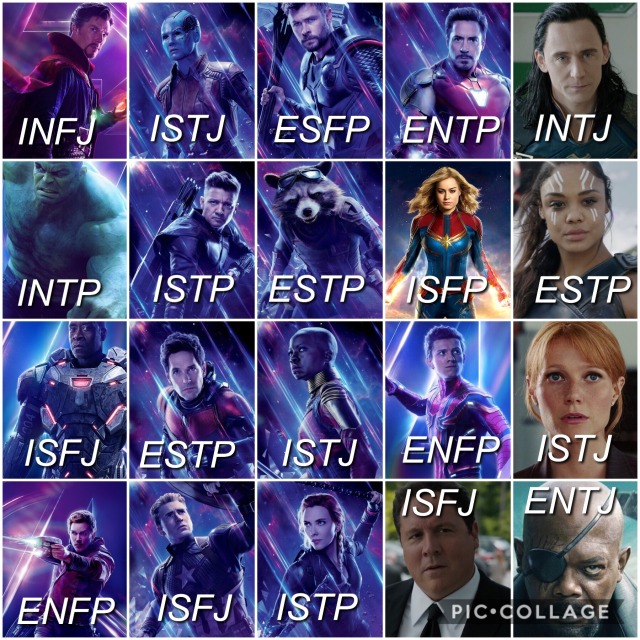 In typical ENTJ fashion, Light argues by organizing logical information and strategizing as his main weapon. He has a talent for seeing what is going on behind the scenes of a situation, and he anticipates what will happen in the future before putting his plans into action. However, like most ENTJs, he can be overly impulsive and get screwed over as a result.
In typical ENTJ fashion, Light argues by organizing logical information and strategizing as his main weapon. He has a talent for seeing what is going on behind the scenes of a situation, and he anticipates what will happen in the future before putting his plans into action. However, like most ENTJs, he can be overly impulsive and get screwed over as a result.
Other ENTJ characters: Dark Yugi (Yu-Gi-Oh!), Esdeath (Akame Ga Kill!), Medusa Gorgon (Soul Eater), Erwin Smith (Attack on Titan), Roy Mustang (FullMetal Alchemist: Brotherhood) .
Infj - Izuku Midoria, My Hero Academia
Compassionate and visionary Izuku Midoria personifies the sympathy and determination of Infj. Struggling with his sad childhood, Midoriya does his best to achieve his goal: to become a real superhero like All Might. Midoriya likes to analyze and theorize a lot - and even get too stuck in analysis when it's time for him to act, which is pretty typical of INFJs.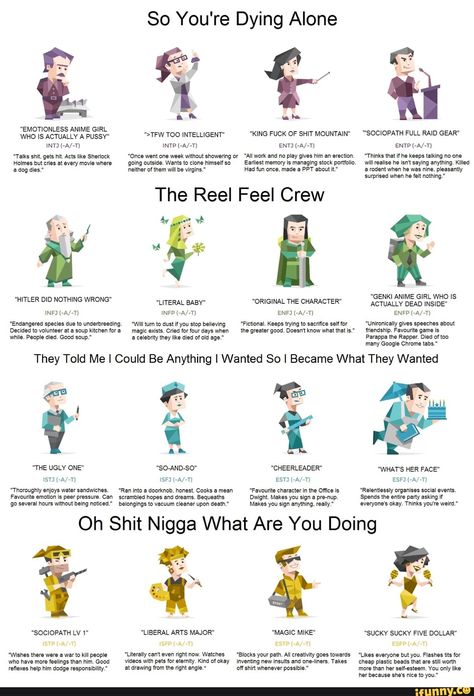 His inner world is full of possibilities, theories and strategies. On the outside, however, he is driven by the need to protect others. When chaos reigns, his first thought is to take care of vulnerable people. He does this with his intuition, anticipating what his enemies will do and how he should react to it. He often picks up on how people will react to situations and uses a combination of his introverted intuition and his tertiary introverted thinking to map out logically for himself how situations will unfold and what the most logical solution should be.
His inner world is full of possibilities, theories and strategies. On the outside, however, he is driven by the need to protect others. When chaos reigns, his first thought is to take care of vulnerable people. He does this with his intuition, anticipating what his enemies will do and how he should react to it. He often picks up on how people will react to situations and uses a combination of his introverted intuition and his tertiary introverted thinking to map out logically for himself how situations will unfold and what the most logical solution should be.
Other INFJ characters: Silvers Rayleigh (One Piece), Future Trunks (Dragon Ball Z), Tamayo (Kimetsu no Yaiba “Demon Slayer”), Kagaya Ubuyashiki (Kimetsu no Yaiba “Demon Slayer”), Itachi Uchiha (Naruto ), Armin Arlert (Attack on Titan).
INTJ - Lelouch Lamperouge, Code Geass: Lelouch of the Rebellion As Zero, Lelouch has the unique ability to anticipate his enemies' moves and plan his own accordingly.
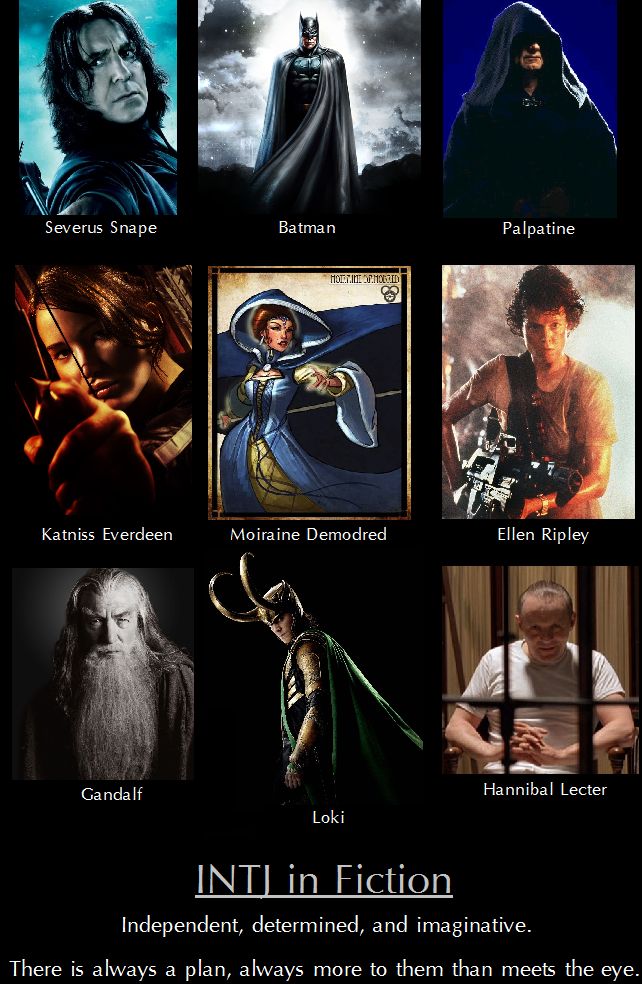 He thinks far into the future, making long-term plans that will change the world. Although on the outside he may appear cold and conniving, on the inside he cares deeply for the well-being of the downtrodden and downtrodden. It is here that his tertiary introverted feeling comes into play in tandem with his introverted intuition. He doesn't mind playing the bad guy as long as he defends his values and beliefs with his difficult plan.
He thinks far into the future, making long-term plans that will change the world. Although on the outside he may appear cold and conniving, on the inside he cares deeply for the well-being of the downtrodden and downtrodden. It is here that his tertiary introverted feeling comes into play in tandem with his introverted intuition. He doesn't mind playing the bad guy as long as he defends his values and beliefs with his difficult plan. Other INTJ characters: Kai Chisaki (My Hero Academia), Akihiko Kayaba (Sword Art Online), Karma Akabane (Assassination Classroom), Ciel Phantomhive (Black Butler), Kyoko Kirigiri (Draganropa)
ESFP – Natsu Dragneel, Fairy Tail
A carefree adventurer, Natsu reflects the impulsiveness and intelligence of the ESFP personality type. He lives for today, making the most of every moment and enjoying the energy of a good fight. But he's not some stupid (or heartless) jock.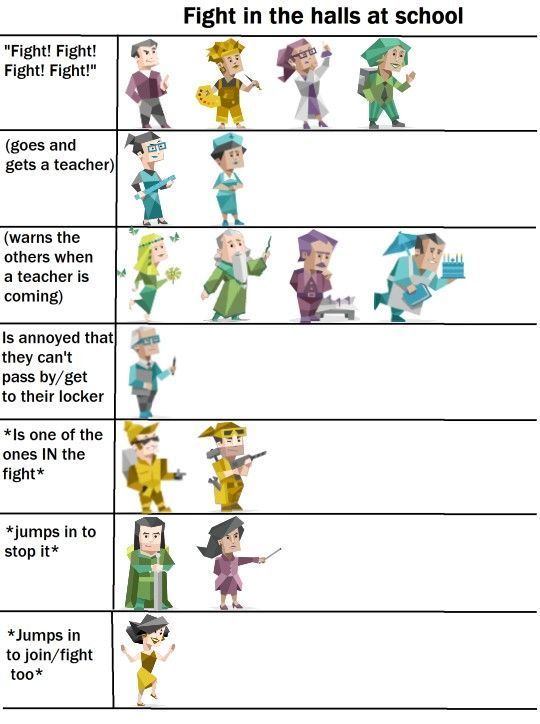 Natsu is insanely loyal and willing to fight for his friends even if his chances are slim. He is able to think quickly and use his surroundings to deal with obstacles when facing an opponent in a dangerous situation. His humor, liveliness, and loyalty to friends are all hallmarks of the ESFP personality type.
Natsu is insanely loyal and willing to fight for his friends even if his chances are slim. He is able to think quickly and use his surroundings to deal with obstacles when facing an opponent in a dangerous situation. His humor, liveliness, and loyalty to friends are all hallmarks of the ESFP personality type.
Other ESFP characters: Kou Seiya (Sailor Moon), Mina Ashido (My Hero Academia), Hizashi Yamada (My Hero Academia), Yuga Aoyama (My Hero Academia), Zenitsu Agatsuma (Kimetsu no Yaiba “Demon Slayer”) Cullen Stadtfield (Code Geass: Lelouch of the Rebellion), Sasha Braus (Attack on Titan)
ESTP – Katsuki Bakugo, My Hero Academia
with the aggressive spirit of Katsuki Bakugo. This character has restless energy and almost unsurpassed tactical abilities. Bakugou can think quickly in battle, reflexively reacting to his opponents' actions in ingenious ways to outsmart them. In typical ESTP fashion, he accepts the challenge, using 110% of his energy to defeat enemies.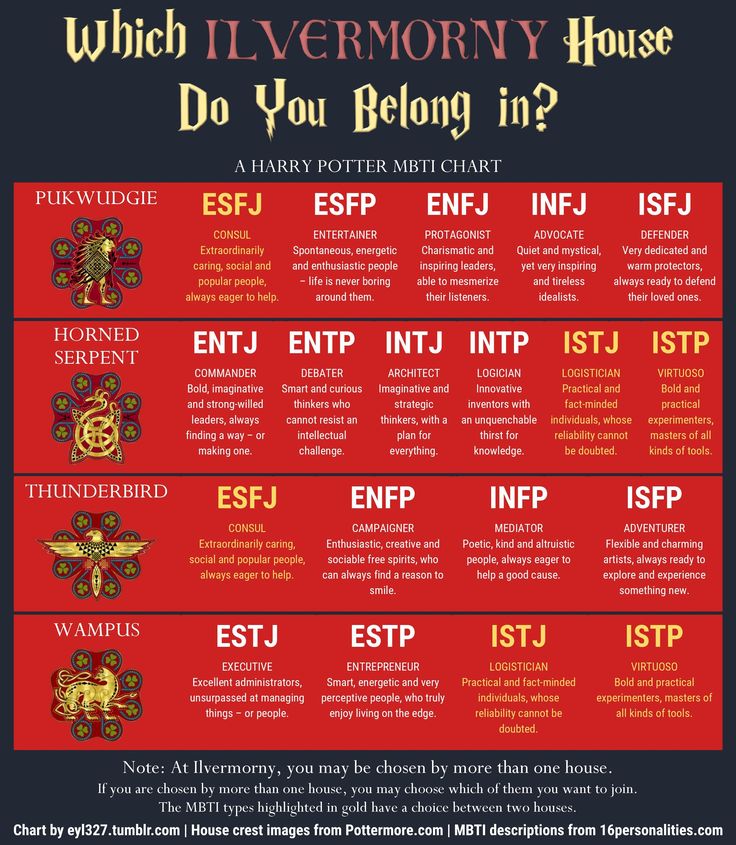 Although from the outside it may seem that the main thing for Bakugou is physical strength, when people see him in action, they are surprised at how smart and inventive his moves are. He is extremely intelligent and perceptive, and is capable of not only strategic planning but also rapid improvisation.
Although from the outside it may seem that the main thing for Bakugou is physical strength, when people see him in action, they are surprised at how smart and inventive his moves are. He is extremely intelligent and perceptive, and is capable of not only strategic planning but also rapid improvisation.
Other ESTP characters: Phinks (Hunter X Hunter), Nemuri Kayama (My Hero Academia), Inosuke Hashibira (Kimetsu no Yaiba “Demon Slayer”), Envy (Fullmetal Alchemist: Brotherhood), Chuuya Nakahara (Bungou Stray Dogs) .
11 ISFP-Shoto Todoroki, My Hero Academia
Many of Torodoroki as IntJ, but probably this is due to false ISFP stereotypes. Todoroki is extremely quick to react to sudden crises, while INTJ is more suited to Lelouch, who is constantly creating strategies and long-term plans in the background. Todoroki adjusts his life to his value system; everything he does must be in accordance with what he thinks is right. He might even go so far as to lose an important fight if that means keeping his valuables. His directness, as well as his reflexes on the battlefield, are a reminder of how powerful introverted and extroverted feelings are when they work together.
He might even go so far as to lose an important fight if that means keeping his valuables. His directness, as well as his reflexes on the battlefield, are a reminder of how powerful introverted and extroverted feelings are when they work together.
Other ISFP characters: Chizome Akaguro (My Hero Academia), Eren Yeager (Attack on Titan), Yuichiro Hyakuya (Seraph of the End), Haruka Nanase (Free!), Masirao Ojiro (My Hero Academia).
ISTP - Shizuo Heiwajima, Durarara!! Powerful and serious, Shizuo Heiwajima fights with incredible strength and tactical prowess. As an ISTP, he is mindful of his surroundings, using everything in his immediate vicinity to destroy his opponents. His communication is direct and logical - he sees no point in verbal skirmishes with the enemy. He is able to quickly navigate crises that would confuse or overwhelm many other types.
Other ISTP characters: Shoto Aizawa (My Hero Academia), Kyoka Jiro (My Hero Academia), Levi Ackerman (Attack on Titan), Saitama (One Punch Man), Shinya Kogami (Psycho-Pass), Ymir (Attack) on Titan).
ESFJ - Shirley Fenett, Code GEASS: Lelouch of the Rebellion
Careful and focused on Shirley Fenet, reflects many strengths of the personality of ESFJ. She always thinks of her friends and the people she loves, even if it puts her in danger. She appears to have a more down-to-earth, practical outlook on life - she often chides Lelouch, who is much more risk-averse. At the Ashford Academy, Shirley often checks to see if the students are all right and aware of morale and how to behave in a proper and conscientious manner.
Other ESFJ characters: Sakura Haruno (Naruto: Shippenden), Maka Albarn (Soul Eater), Leorio (Hunter X Hunter), Katara (Avatar: The Last Airbender), Rose Thomas (Fullmetal Alchemist).
ESTJ - Ezumi Curtis, Fullmetal Alchemist In combat, she uses her surroundings to her advantage and wields weapons with amazing skill. She knows how to deal with complex chaotic situations, as evidenced by the way she shows up at the Center and quickly takes charge.
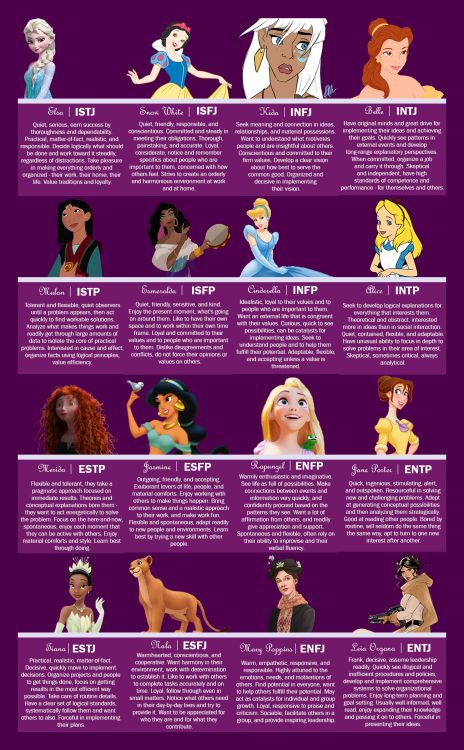 Her practicality and strong leadership qualities are some of the greatest gifts that ESTJs bring to the world.
Her practicality and strong leadership qualities are some of the greatest gifts that ESTJs bring to the world. Other ESTJ characters: Erza Scarlet (Fairy Tail), Takaya Abe (Big Windup!), Asuka Langley Soryu (Evangelion), Sanemi Shinazugawa (Demon Slayer), Rudol von Stroheim (Jojo's Bizarre Adventure), Tornado (One Punch Man), Cornelia Li Britain (Code Geass: Lelouch of the Rebellion).
ISFJ - Ram, ReZero
Gentle, caring Ram personifies attentive to details, ISFJ. She uses her power to protect those she loves and care for them tangibly. She not only attacks, but also heals with her Water magic, protecting those she cares about. She herself is ready to go to her death to protect the people dearest to her. She proves her love by her actions and behavior, but sometimes she is even too good-natured despite her happiness.
Other ISFJ characters: Sophie Hutter (Howl's Moving Castle), Mayuri Sina (SteinsGate), Ryuji (Toradora), Brock (Pokemon), Miroku (Inyuasha), Historia Reiss (Attack on Titan).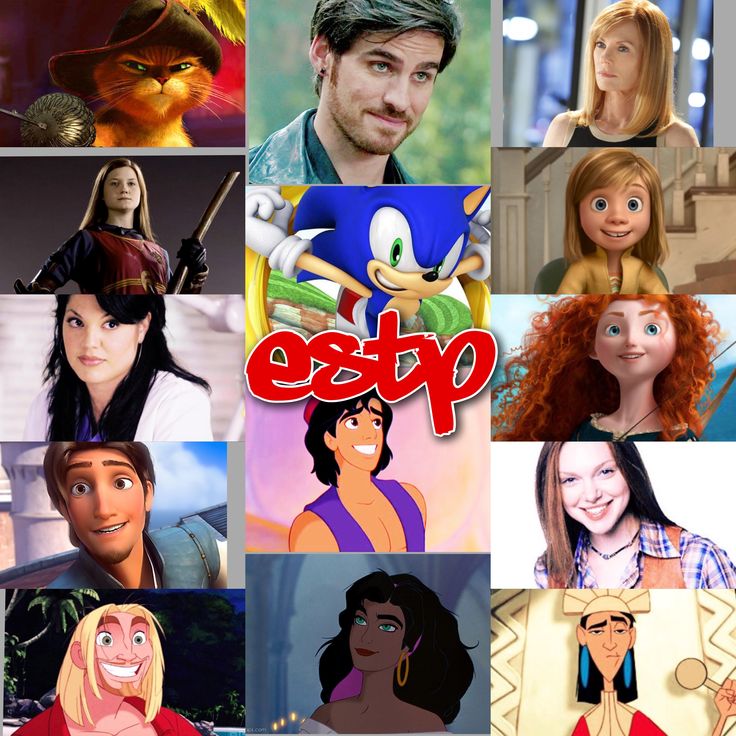
ISTJ - Tenya Iida, My Hero Academia
Tenya, attentive and responsible, always wants to do the right thing. He may follow the rules, but he will break them if necessary when it comes to protecting those he loves the most. He is deeply devoted as a friend and brother, and his discipline and hard work make him a source of strength for the entire UA class. His detail oriented insight allows him to notice when things are out of sync or dangerous and his pragmatic nature allows him to come up with clear action plans when everyone else is in a panic and his thirst for efficiency, his dedication and attention to detail make him a strong ISTJ character.
Other ISTJ characters: Tenzin (Avatar: The Legend of Korra), Boa (One Piece), Shikamaru (Naruto).
Vasily Kudryavtsev – Medium
Vasily Kudryavtsev – MediumVasily Kudryavtsev
Pinned
Compatibility of personality types
by personality type.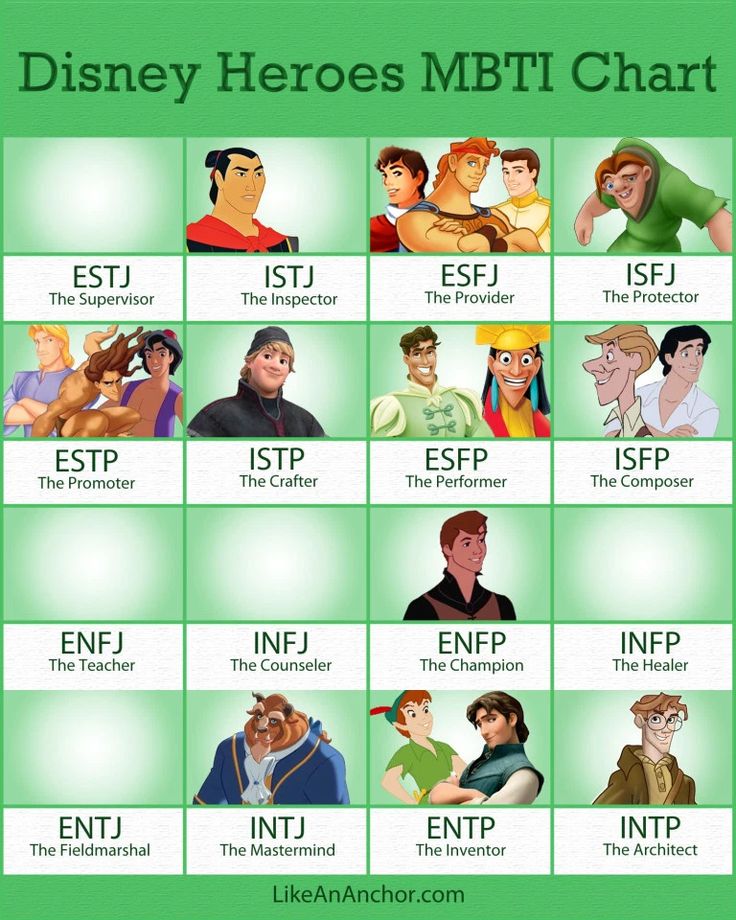 Therefore, if you want to know how compatible you are with another person, you need to know your personality type and the type of your counterpart. As well as compatibility tables for all types of personality. Such compatibility tables can be viewed at the link below. https://relaza.com/intertipnye-otnosheniya-v-socionike
Therefore, if you want to know how compatible you are with another person, you need to know your personality type and the type of your counterpart. As well as compatibility tables for all types of personality. Such compatibility tables can be viewed at the link below. https://relaza.com/intertipnye-otnosheniya-v-socionike
Personality Type
1 min read
personality type compatibilityPeople have long noticed that we are psychologically compatible not with those with whom we want, but with those who approach us by personality type.
Therefore, if you want to know how compatible you are with another person, you need to know your personality type and the type of your counterpart.
As well as compatibility tables for all personality types.
Such compatibility tables can be viewed at the link below.
https://relaza.com/intertipnye-otnosheniya-v-socionike
Pinned
Which anime character are you?
Which anime character are you? I thought about personality typing with the help of characters from various anime and cartoons.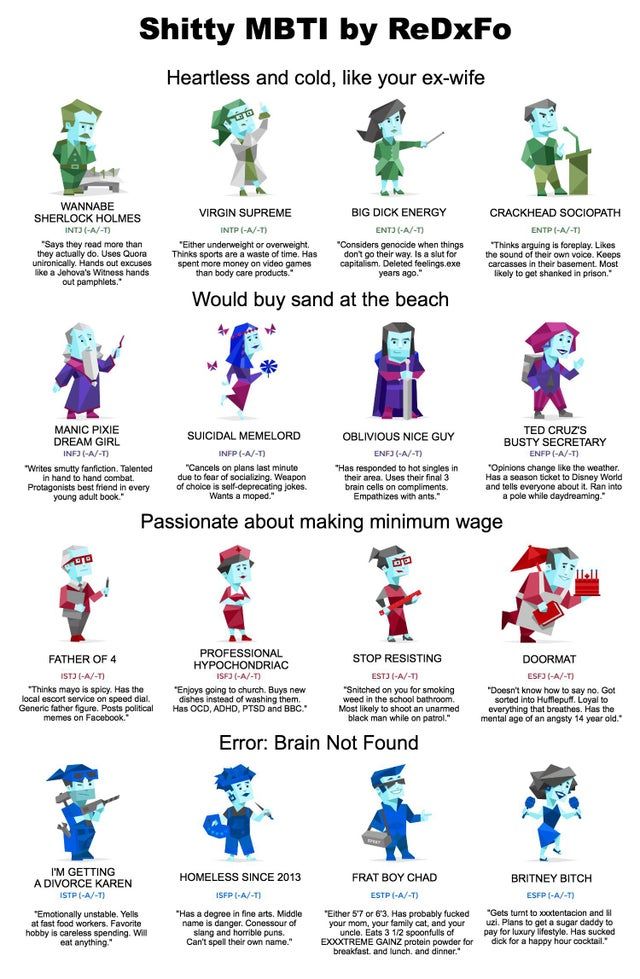 It should be noted that the characters of anime characters are drawn quite one-sidedly and the emphasis is on several characteristic features. It's over not a living multifaceted personality with all its advantages and disadvantages. …
It should be noted that the characters of anime characters are drawn quite one-sidedly and the emphasis is on several characteristic features. It's over not a living multifaceted personality with all its advantages and disadvantages. …
1 min read
Sep 17
Personality Types of Metal Family Characters
Today we will analyze the personality types of Metal Family characters. The test and all the main characters of Metal Family on one page - here And below are the psychological portraits of each: Lif Diana Glam GustavSchwagenwagens Garlic Heavy Vicki Dee
1 min read
Who are you from Metal Family?Today we will analyze the personality types of the characters " Metal Family ".
Test and all the main characters Metal Family on one page - here is
And below psychological portraits of each:
Lif
Diana
GLEM
Gustavvagengagenes
Garlic
Havi
DI
9000 9000 9000 APR APR 15.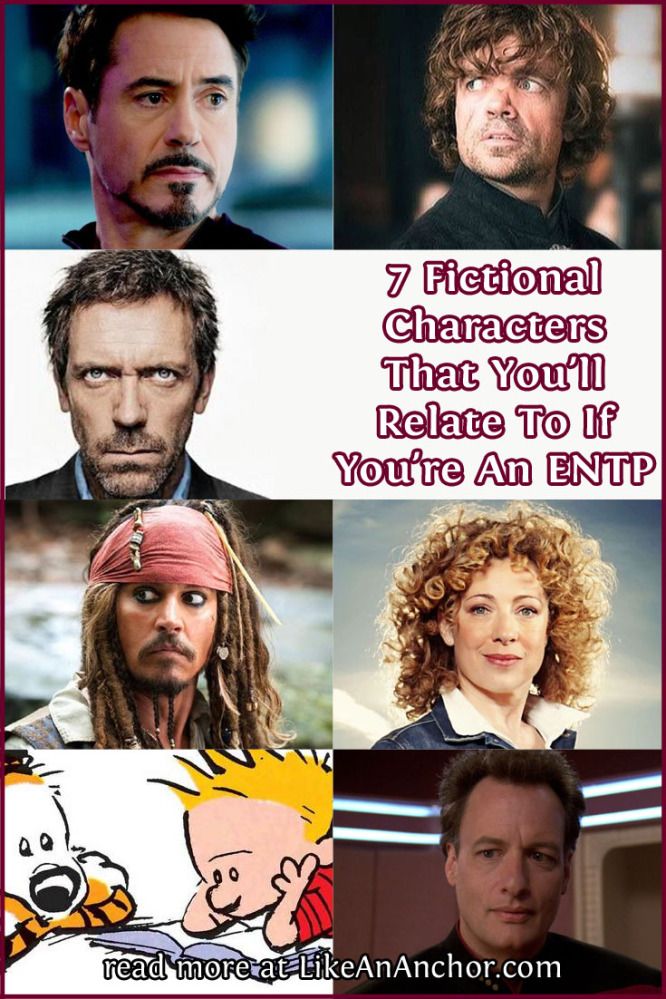
Who are you from the anime The Promised Neverland?
Today we will analyze the personality types of the characters in Yakusoku no Neverland. The test and all the main characters of Neverland on one page - here And below are the psychological portraits of each: Ray Noramn Isabella Yugo Gilda Emma Don Phil
1 min read
Today we will analyze the personality types of the characters in Yakusoku no Neverland.
Test and all the main characters of non -serrend on one page - here is
And below psychological portraits of each:
RE
NOMNIsabella
Guild
Emma
Fil
9000 MAR 29 , 2021
Who are you from the anime "Black Butler"?
You can take the test to match the characters of the anime “Black Butler” here Psychological portraits of the main characters at the links below: Ciel Phantomhive Joker Finnian Grell Sutcliff Elizabeth Midford Alois Trancy Sebastian Michaelis Undertaker0003
1 min Read
characters “Kuroshitsuji”Pass the ANime “Dark butler” Complexed
Psychological portraits of the main characters below:
Ciel phantomhe
Joker
Finnian
Grell
Elizabeth Midford
Alois Trancy
Sebastian Michaelis
The Undertaker
Take the quiz to find out which Black Butler you are
Mar 21, 2021
Who are you from Skate Infinity?
Which of the new SK8 the Infinity anime do you resemble in personality? Take a psychological test here or see the psychological portraits of the main characters of this anime below: Langa Hasegawa Reki Kyan Ainosuke Shindo Kaoru Sakurayashiki Kojiro Nanjo Miya Chinan Tadashi Kikuchi Hiromi Higa
1 min read
"SK∞" charactersSK8 the Infinity" are you similar in personality type?
Evangelion Anime Character Personality Types
The last part of Evangelion "Evangelion: 3.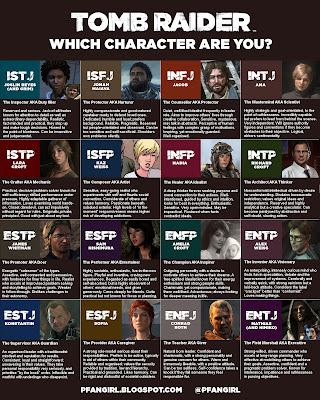 0+1.0: Thrice Upon a Time" has recently been released. We look at the psychotypes of all the characters of "Eve" here. Or for each in more detail: Toji Suzuhara Yui Ikari Hikari Horaki Maya Ibuki Ritsuko Akagi Gendo Ikari Ryoji Kaji Rei Ayanami Asuka Soryu Misato Katsuragi Kaoru Nagisa Shinji Ikari
0+1.0: Thrice Upon a Time" has recently been released. We look at the psychotypes of all the characters of "Eve" here. Or for each in more detail: Toji Suzuhara Yui Ikari Hikari Horaki Maya Ibuki Ritsuko Akagi Gendo Ikari Ryoji Kaji Rei Ayanami Asuka Soryu Misato Katsuragi Kaoru Nagisa Shinji Ikari
1 min read
Evangelioncharacters : Thrice Upon a Time"
. We look at the psychotypes of all the characters of "Eve" here.or for each more details:
TODIS Suzuhara
Yui Ikari
Horaki
Maya ibuki
Ritsuko Akagi
Gando Ikari
READSIA
Rajanami 9000 Nagisa
Shinji Ikari
Feb 25, 2021
Which Umbrella Academy are you? Personality test.
The Umbrella Academy Character Personality Types Klaus “#4” Hargreeves Number Five Vanya “#7” Hargreeves Ben “#6” Hargreeves Diego “#2” Hargreeves Pogo Allison “#3” Hargreeves Reginald Hargreeves The Handler Lila Pitts Luther “#1” Hargreeves Hazel
1 min read
MBTI charts “ The Umbrella Academy”The Umbrella Academy Character Personality Types
Klaus “# 4” 9000 Five Hargreeves 30002 Vanya “No.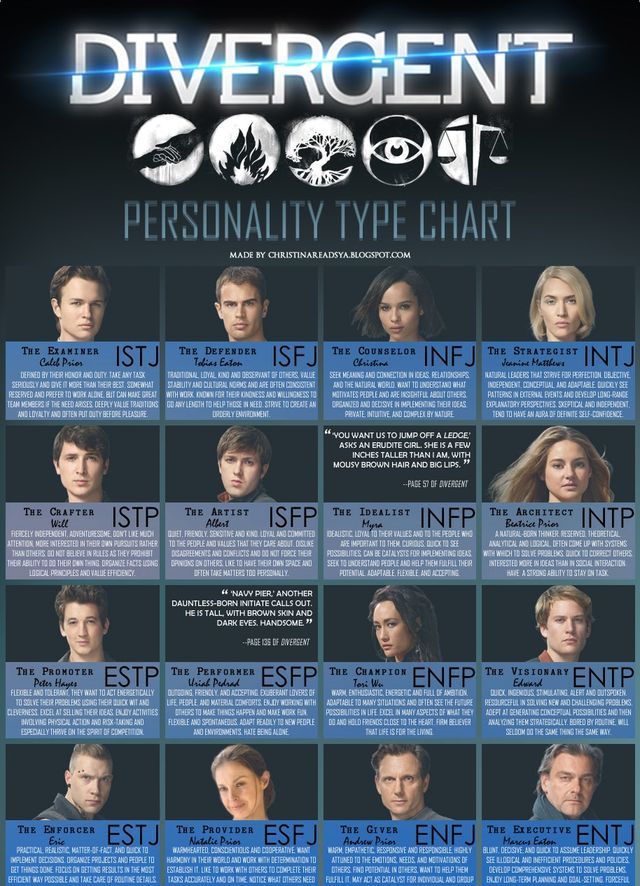 7” Hargreevs
7” Hargreevs
Ben “No. 6” Hargreeves
Diego “No. 2” Hargreevs
Pogo
Allison “Hargreevs
Reginald Hargreevs
THE HANDLERA 9000 9000 9000 9000 9000 9000 9000 9000 9000 9000 9000 9000 9000 9000 #1” Hargreeves
Hazel
Feb 2, 2021
Attack on Titan Anime Character Types
The following are the personality types of the popular post-apocalyptic manga Attack on Titan: Ackerman Marco Bodt Eren Kruger Reiner Braun Sasha Braus Jean Kirstein Pieck Finger Annie Leonhard Erwin Smith Hange Zoe Zeke Yeager Yelena Mikasa Eren Yeager Historia Reiss Armin Arlert0003
1 min read
Attack on Titan CharactersBelow are the personality types of the popular post-apocalyptic manga “Attack on Titan”: to try it on your favorite manga character.
Jan 11, 2021
Magic Battle Characters Personality Types
Which Magic Battle (Jujutsu Kaisen) character do you resemble in personality? See below the personality types of the most popular manga characters: Satoru Gojo - 100% "Seeker" (ENTP) Yuji Itadori - "Intermediary" (ISFP).